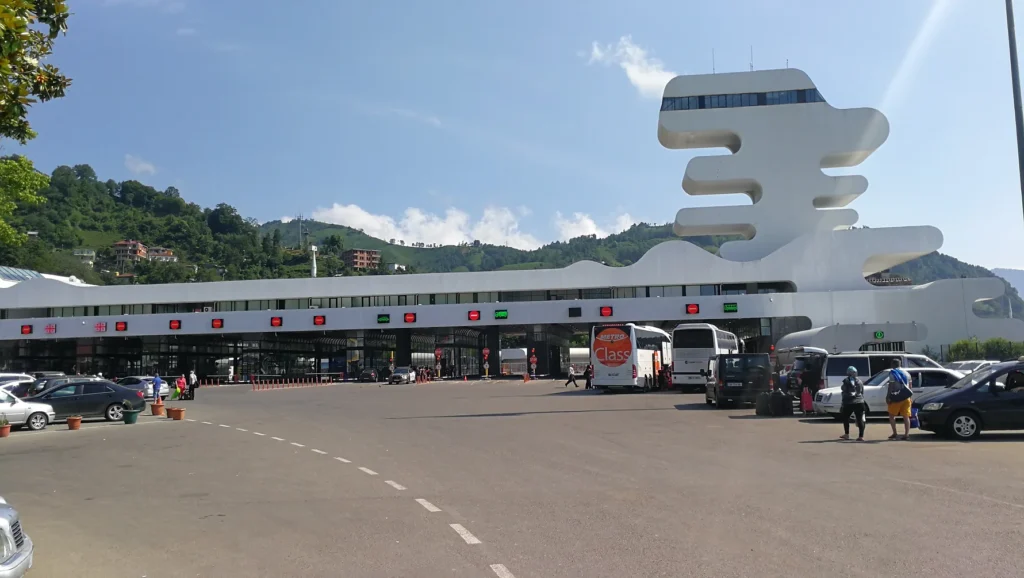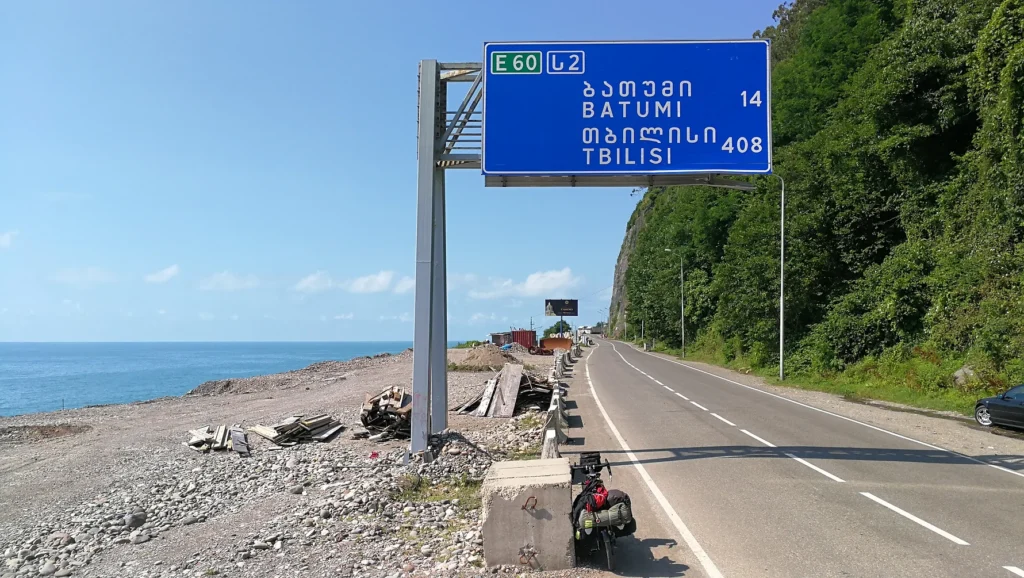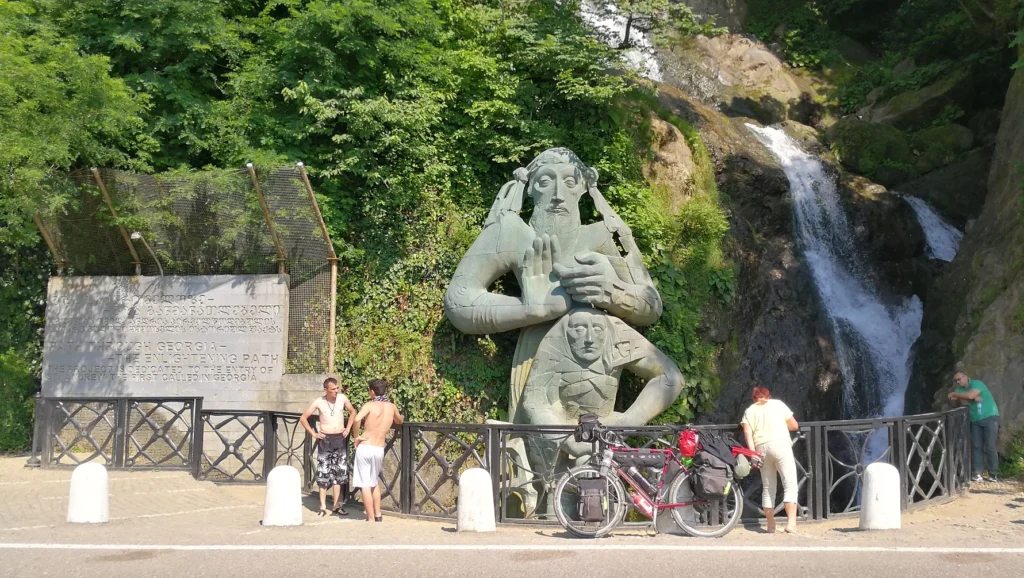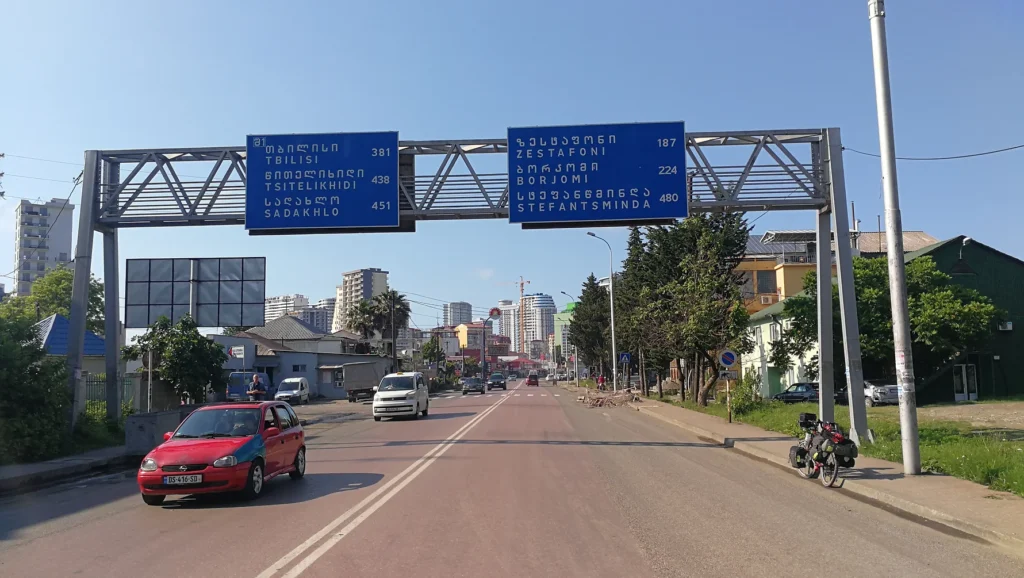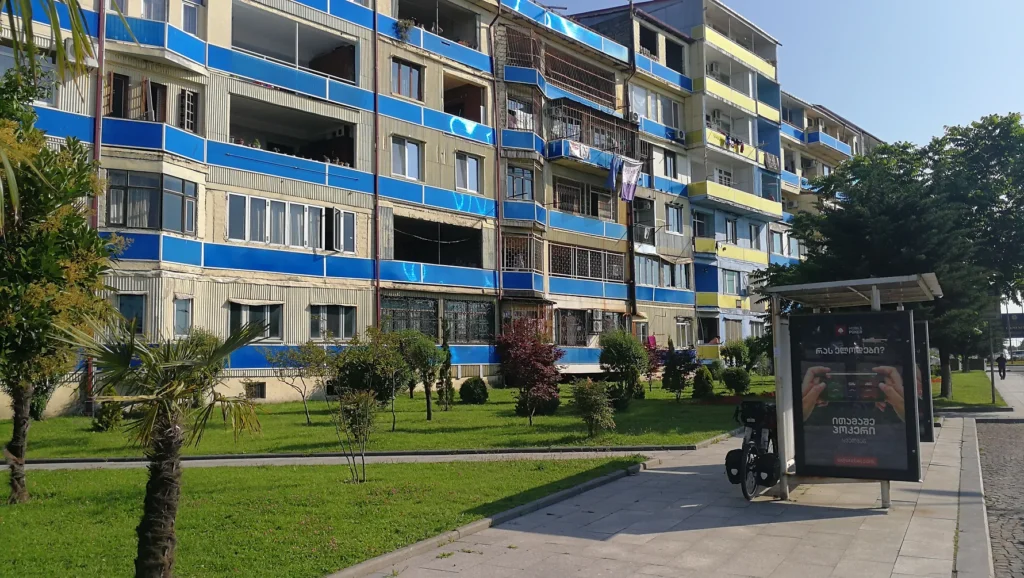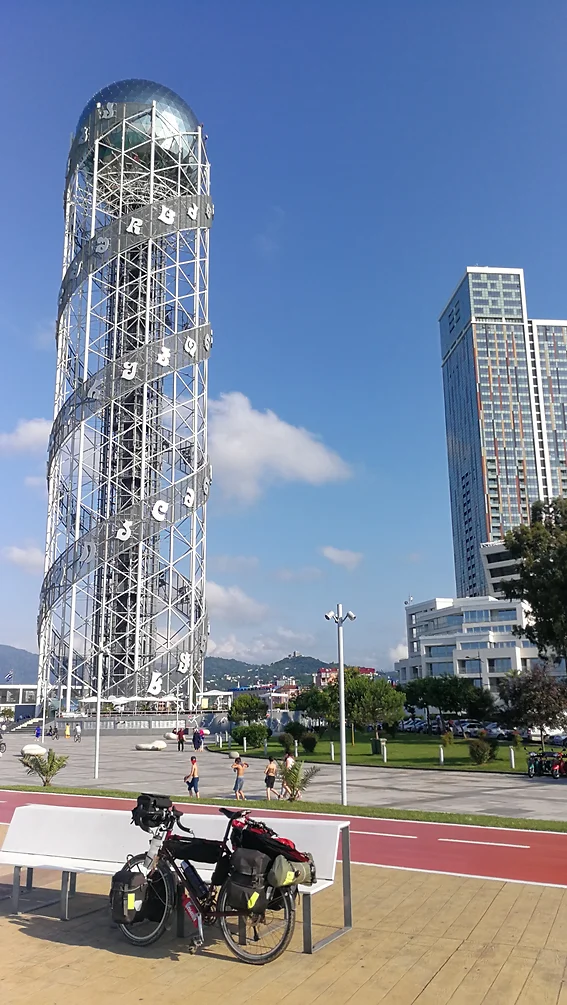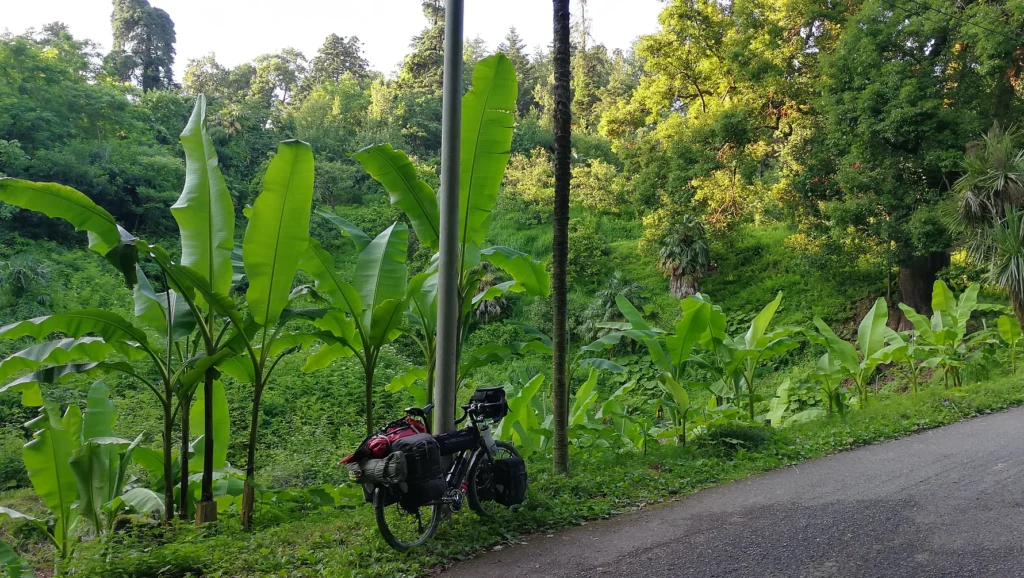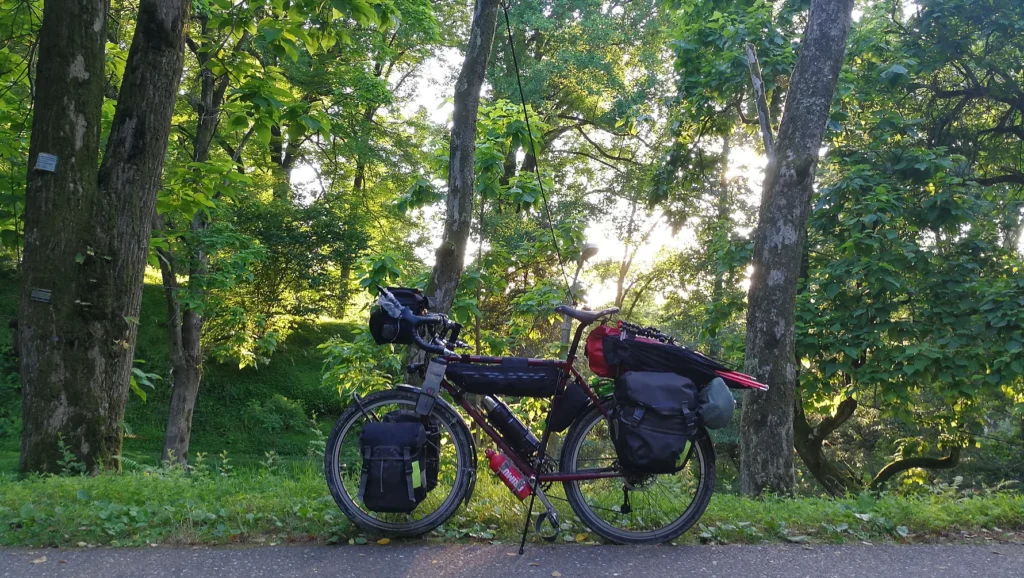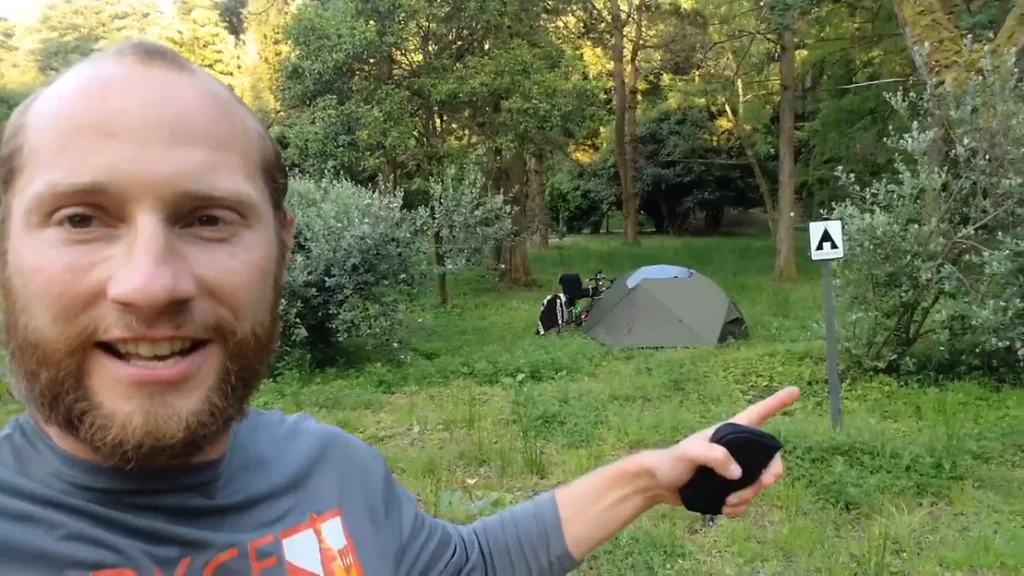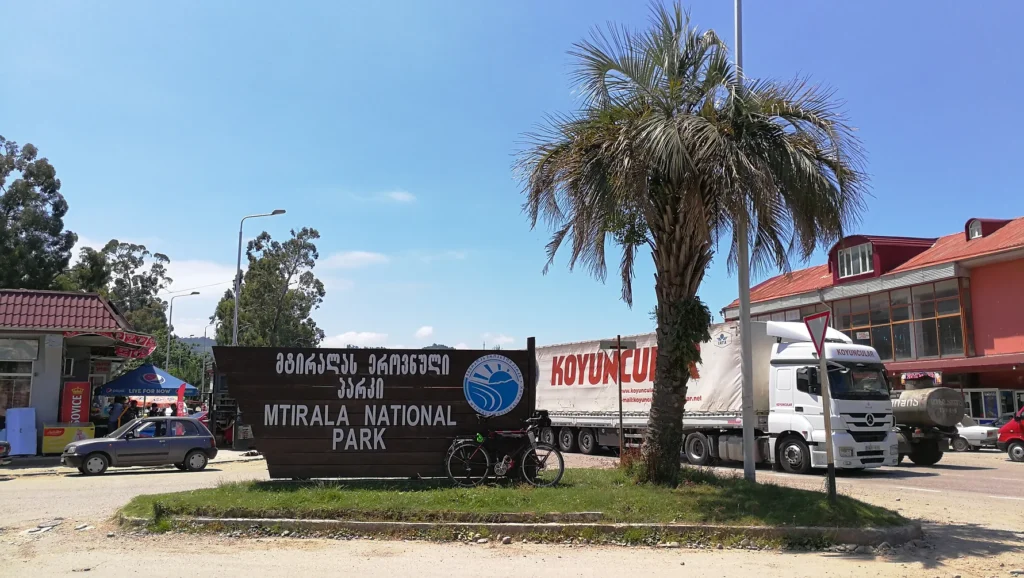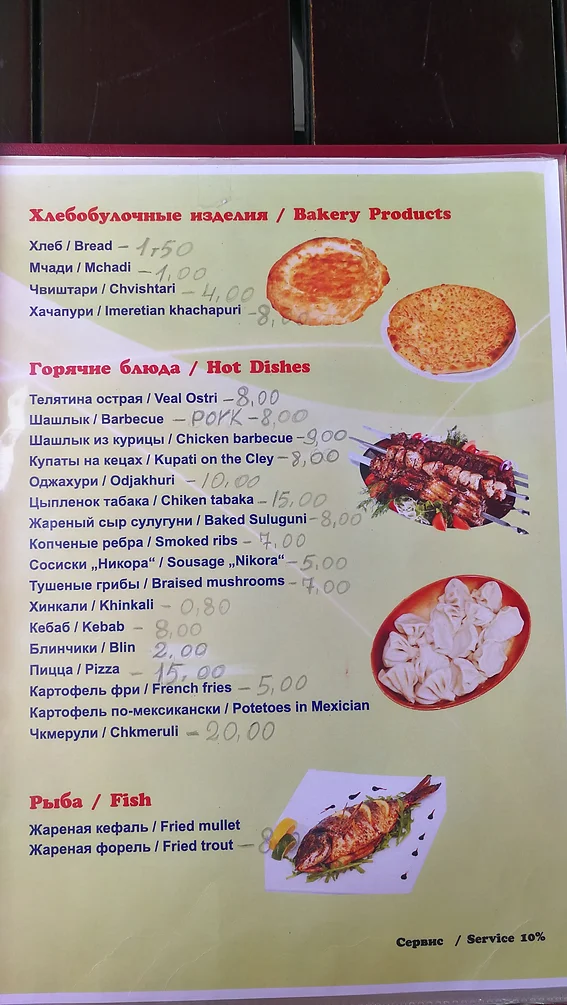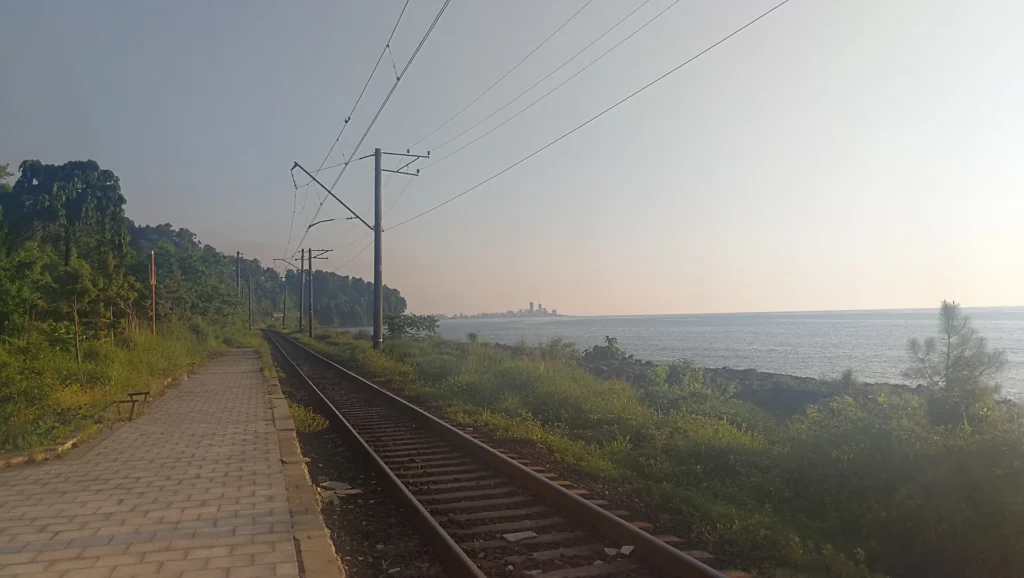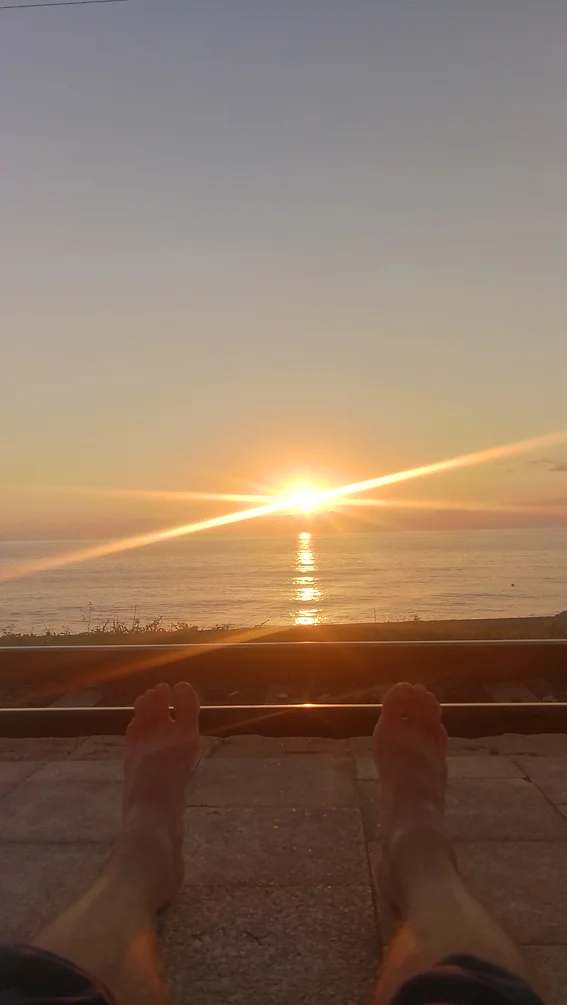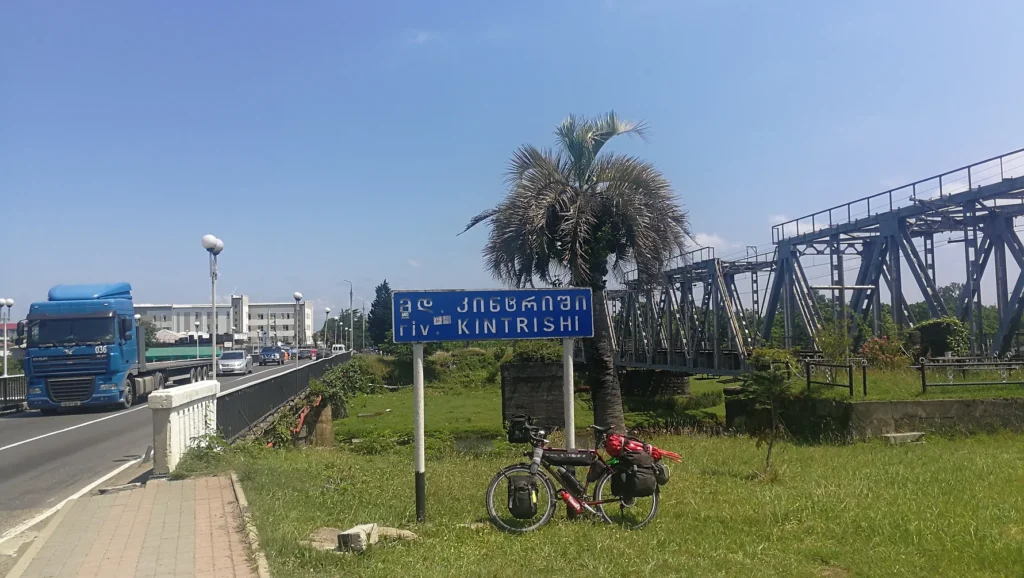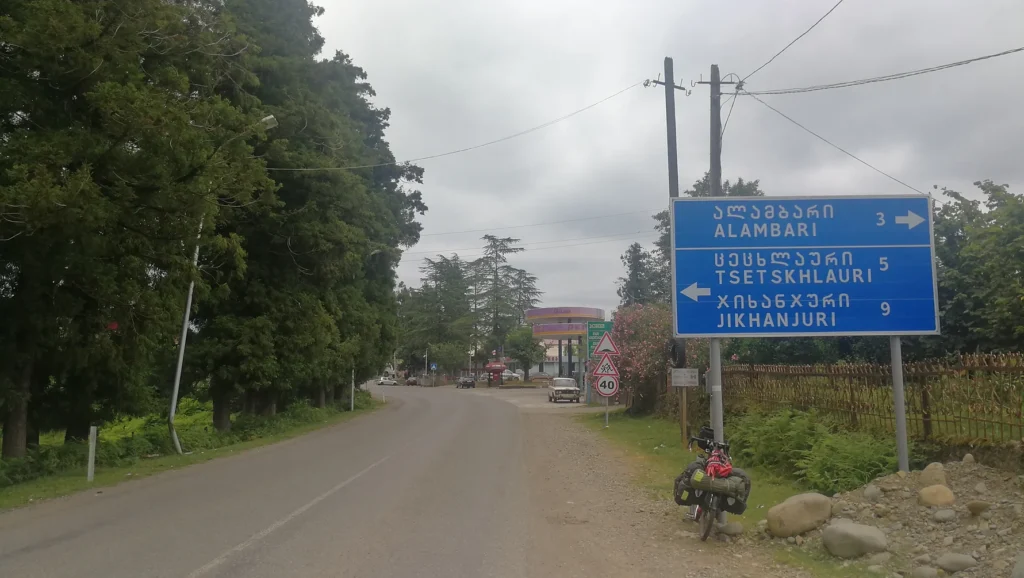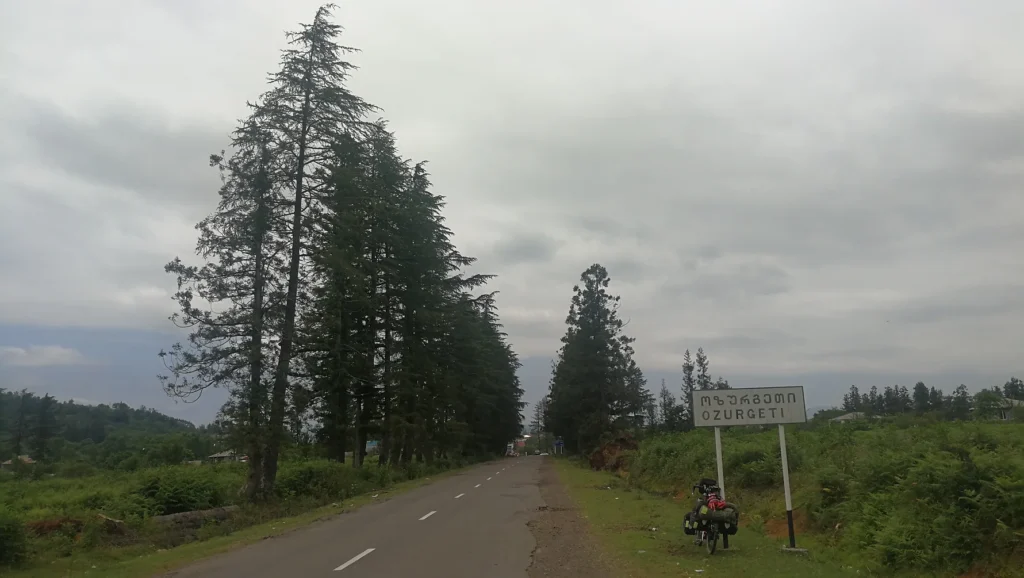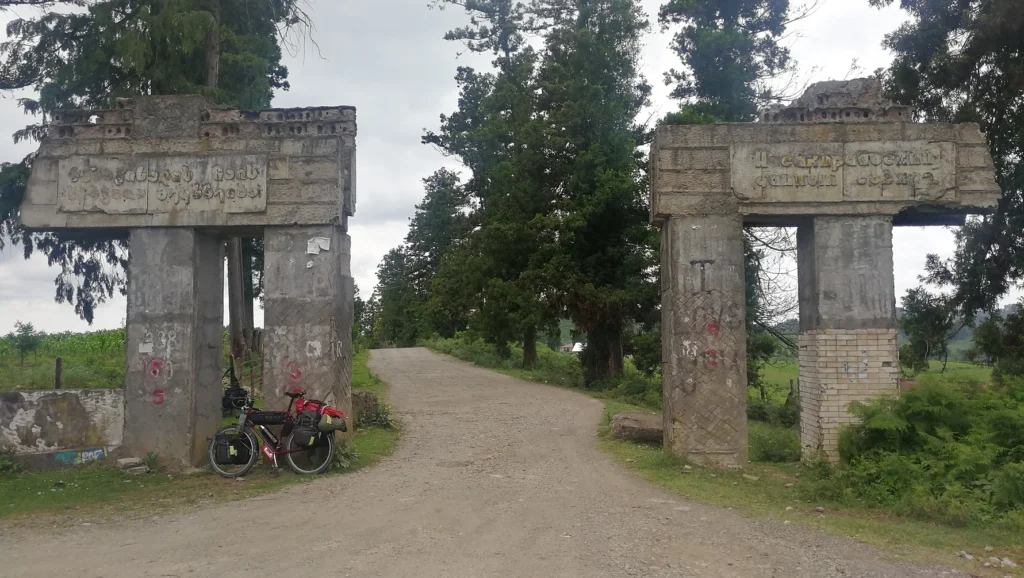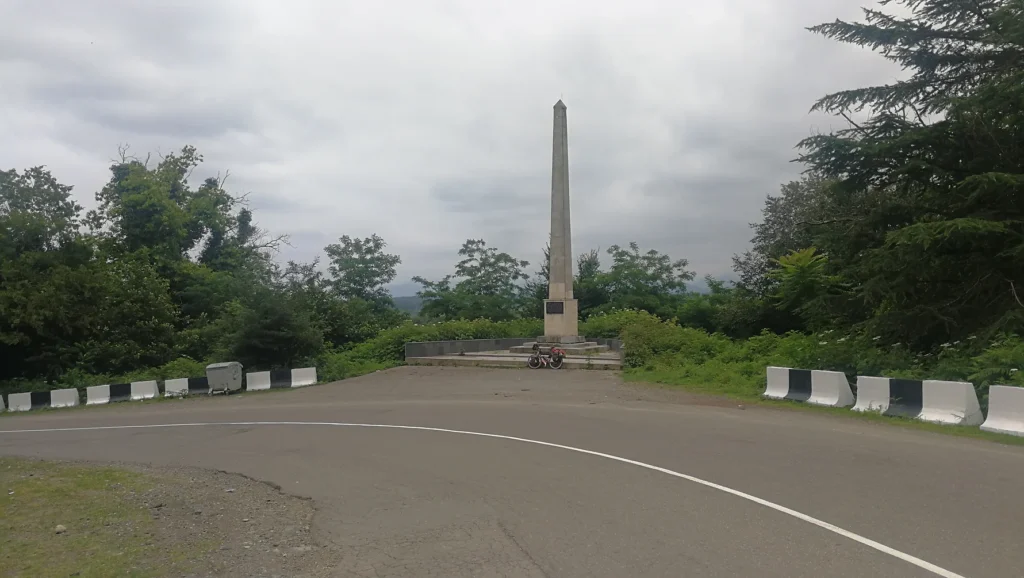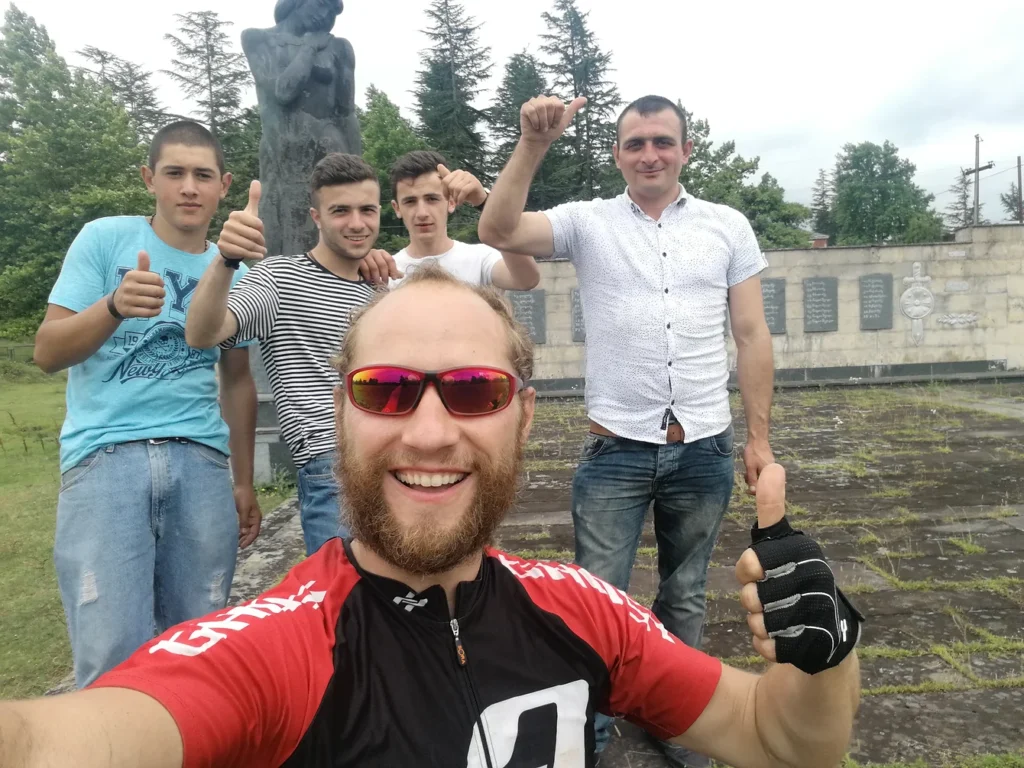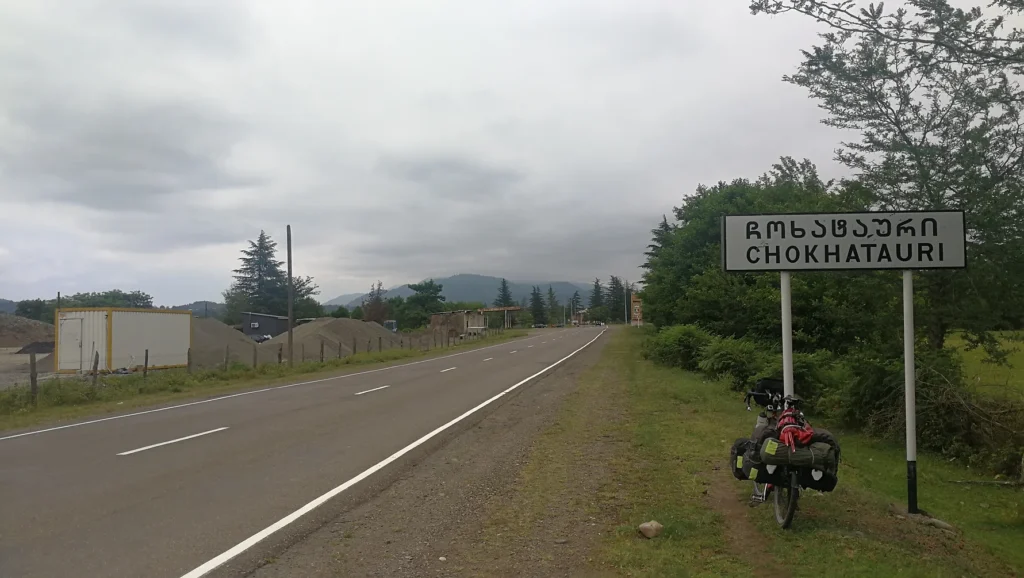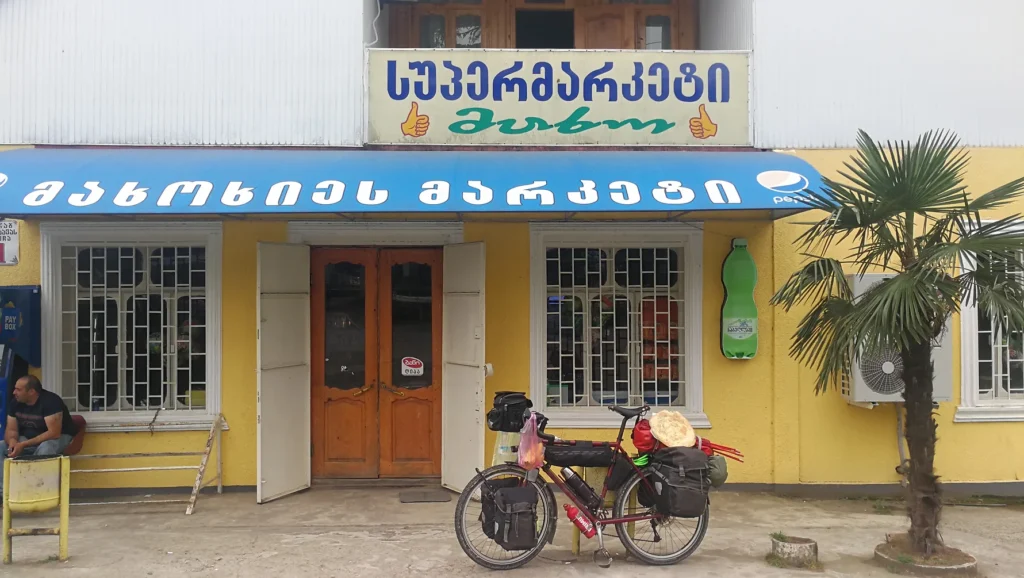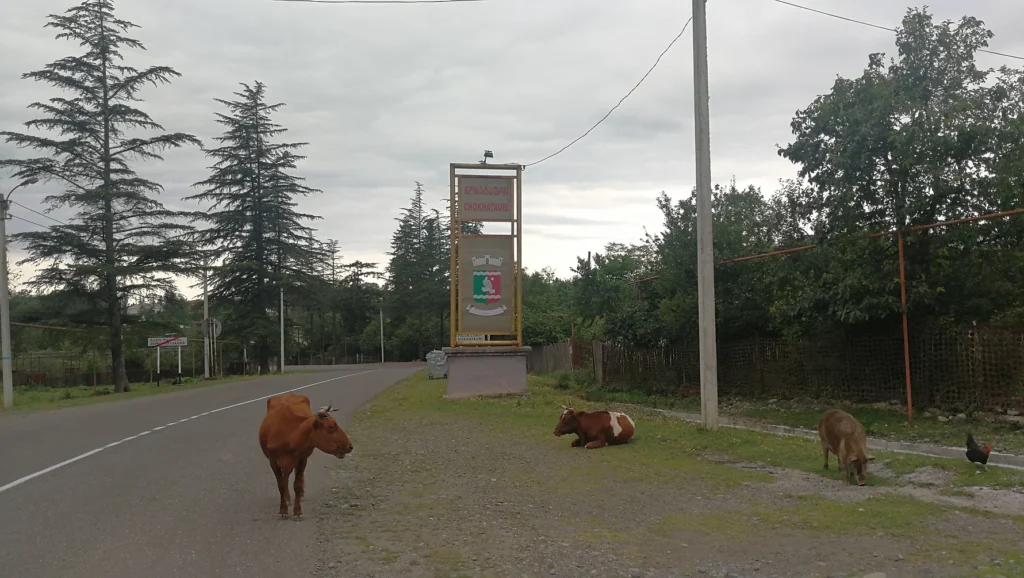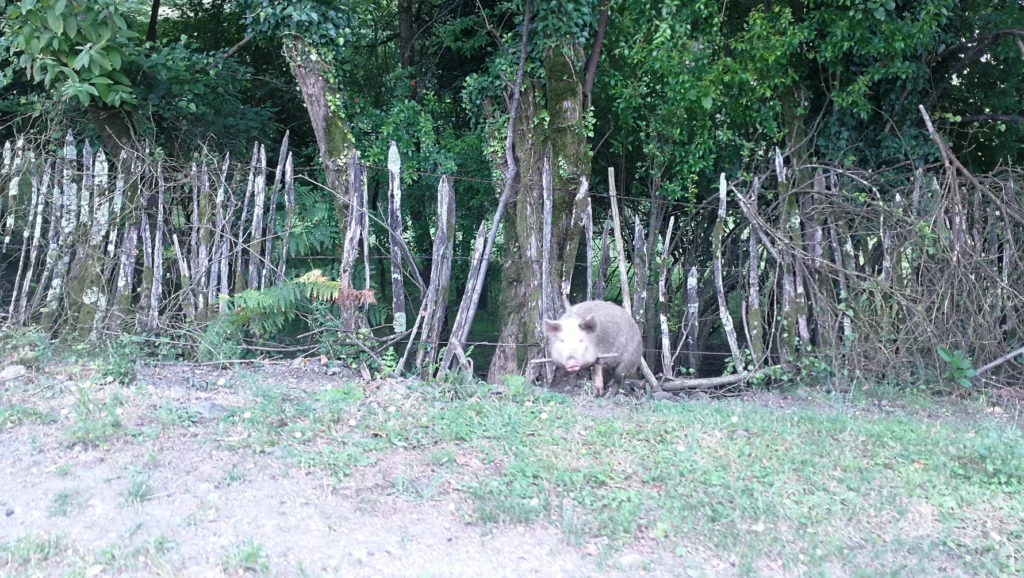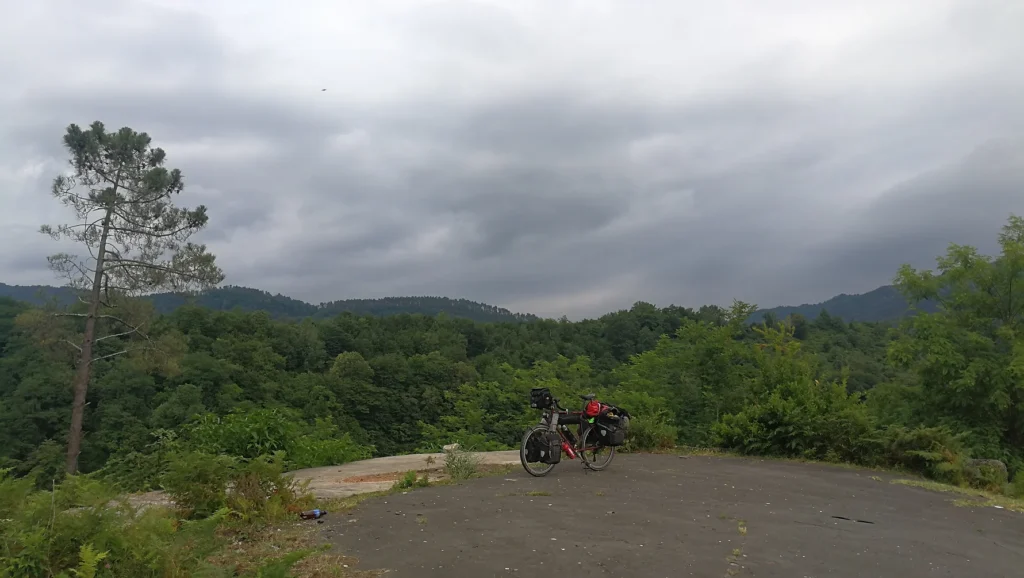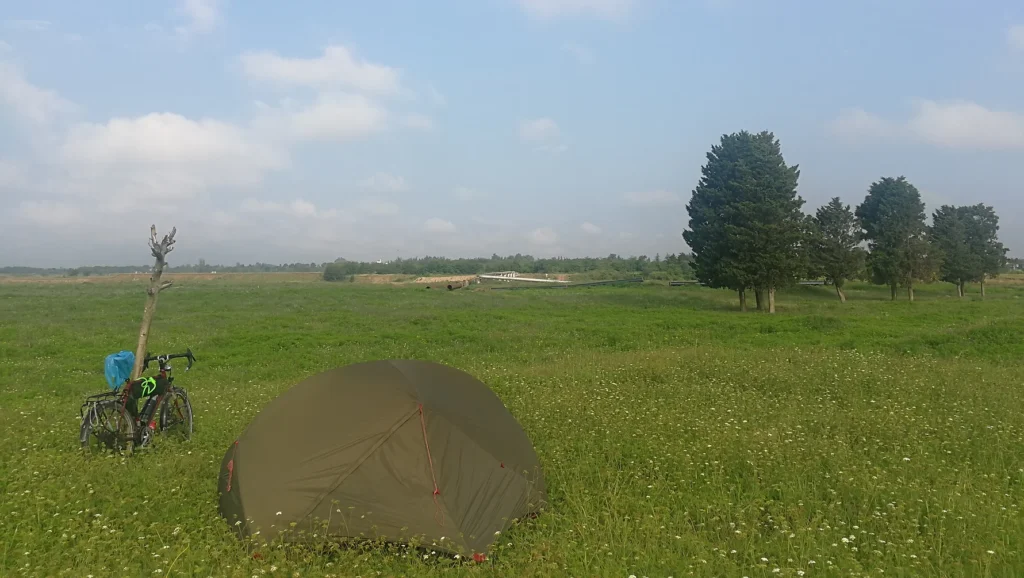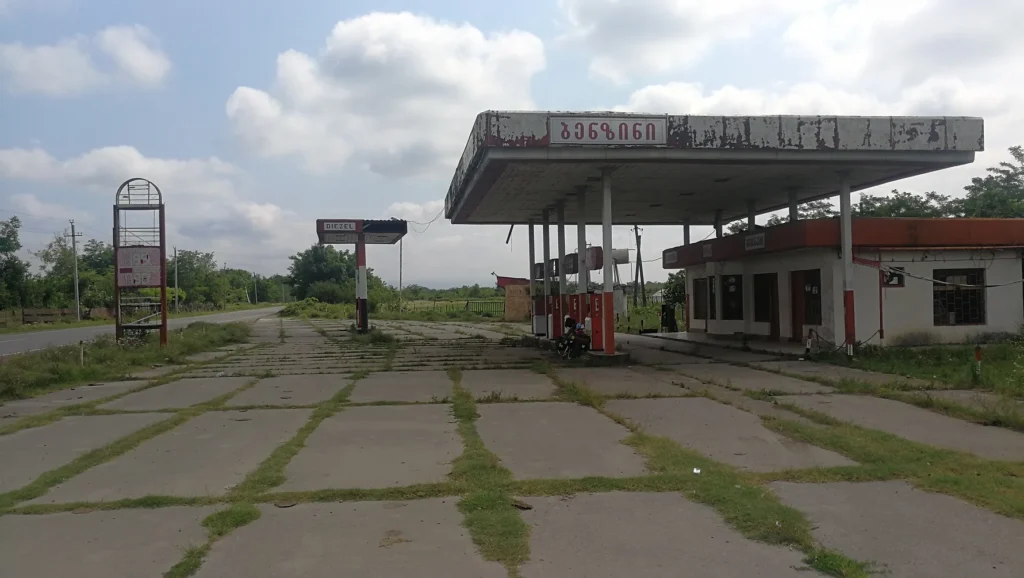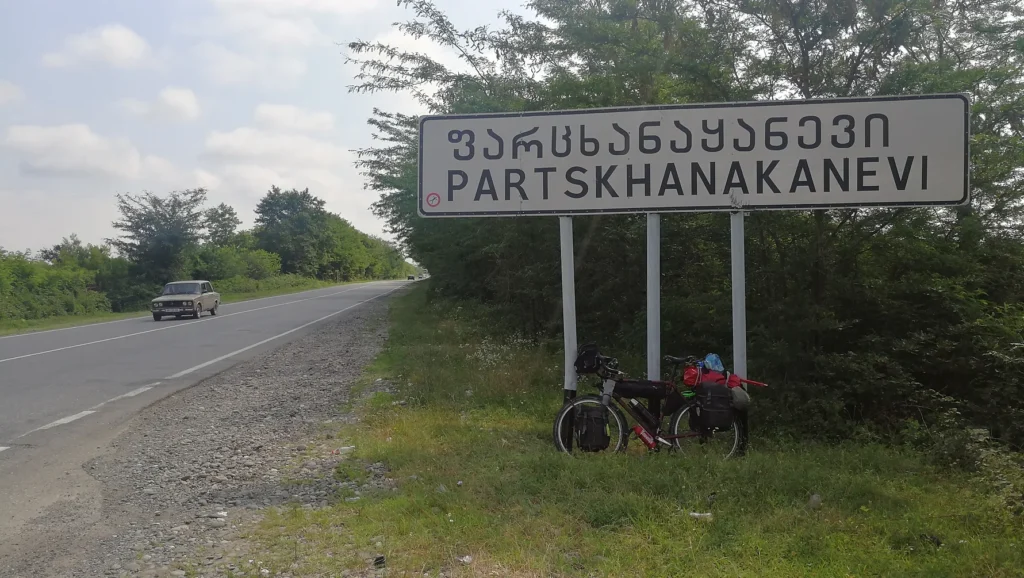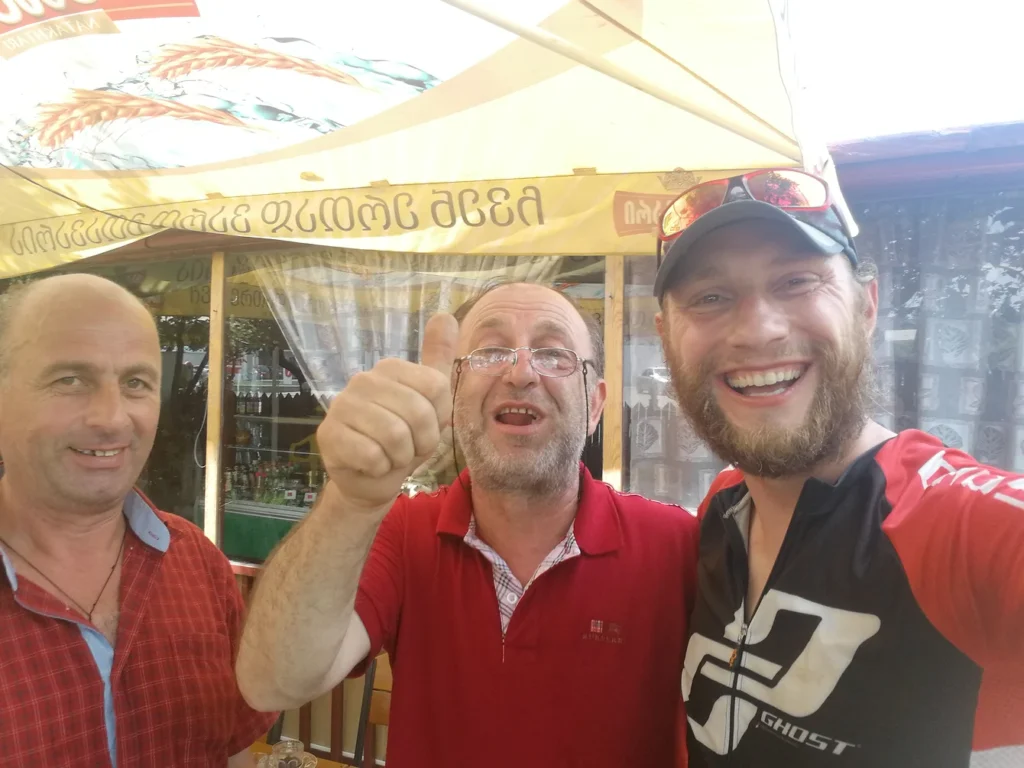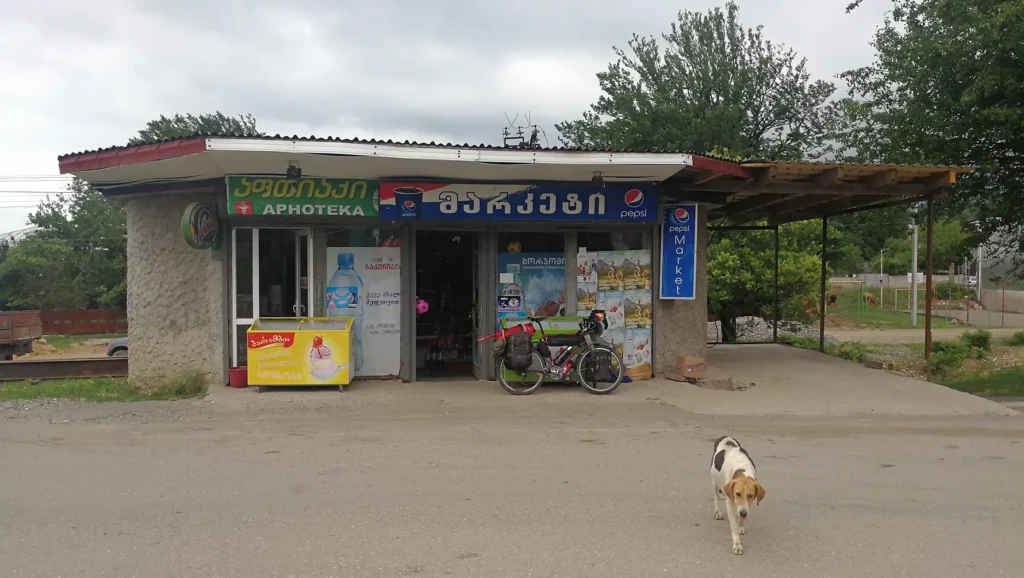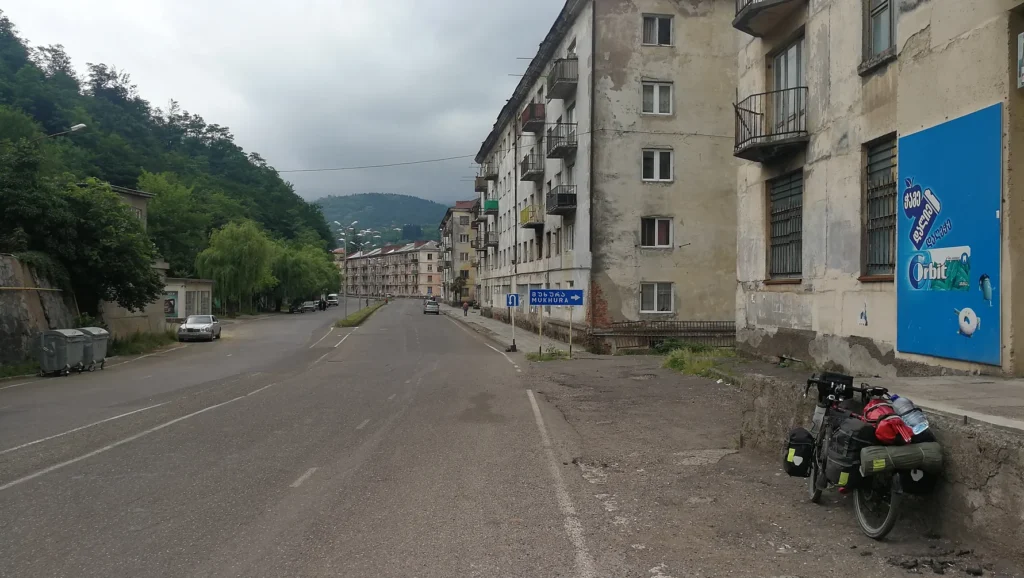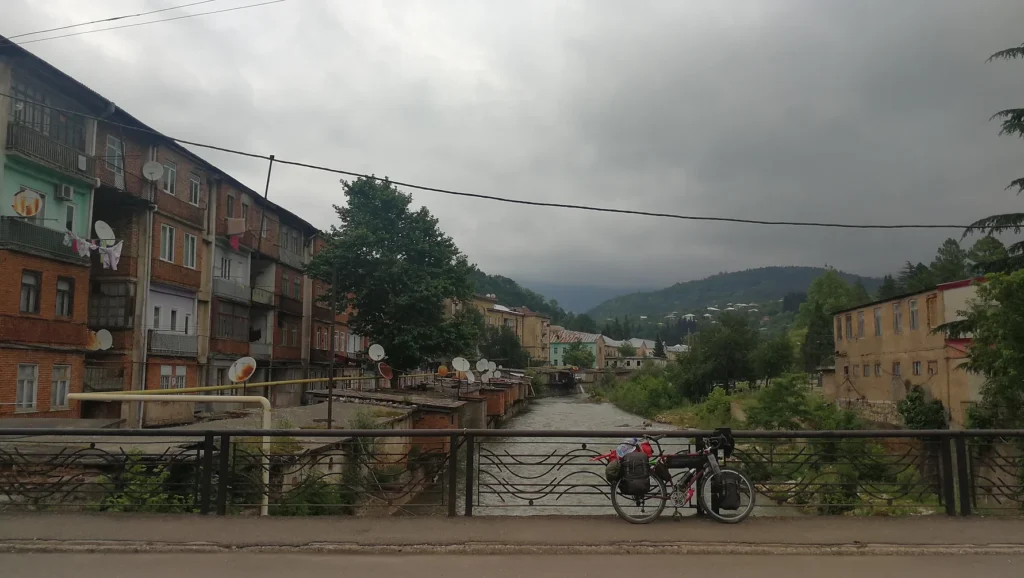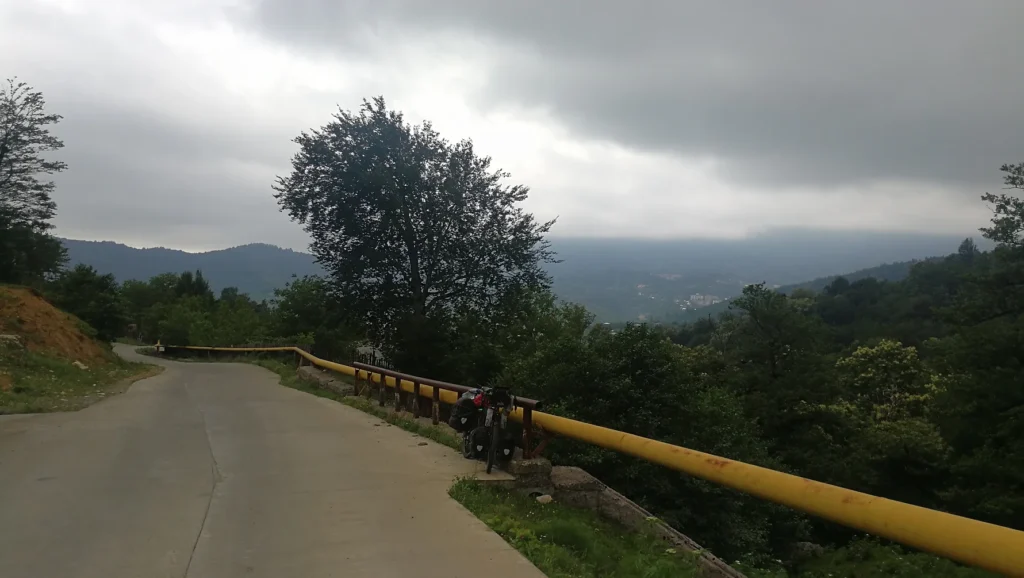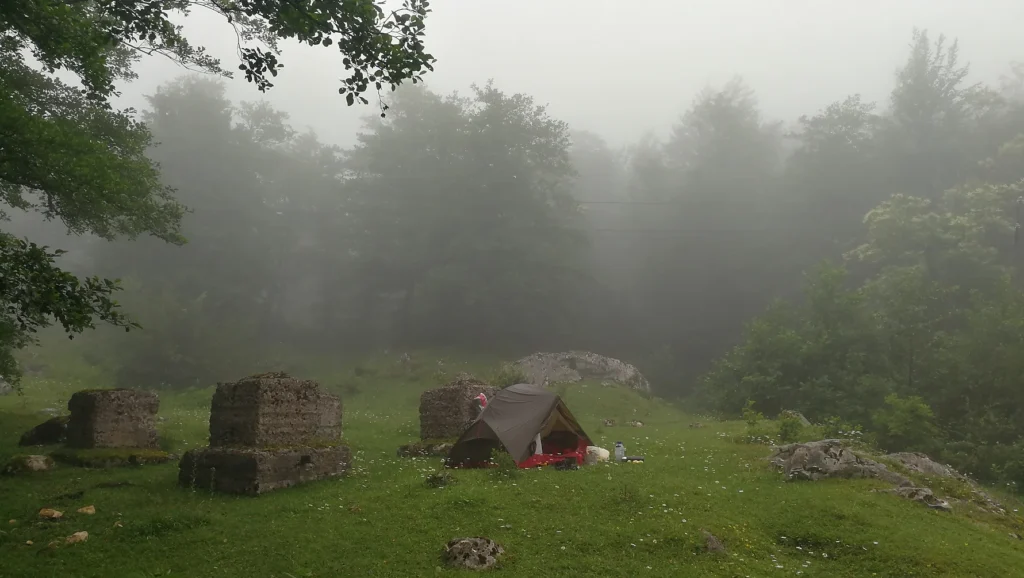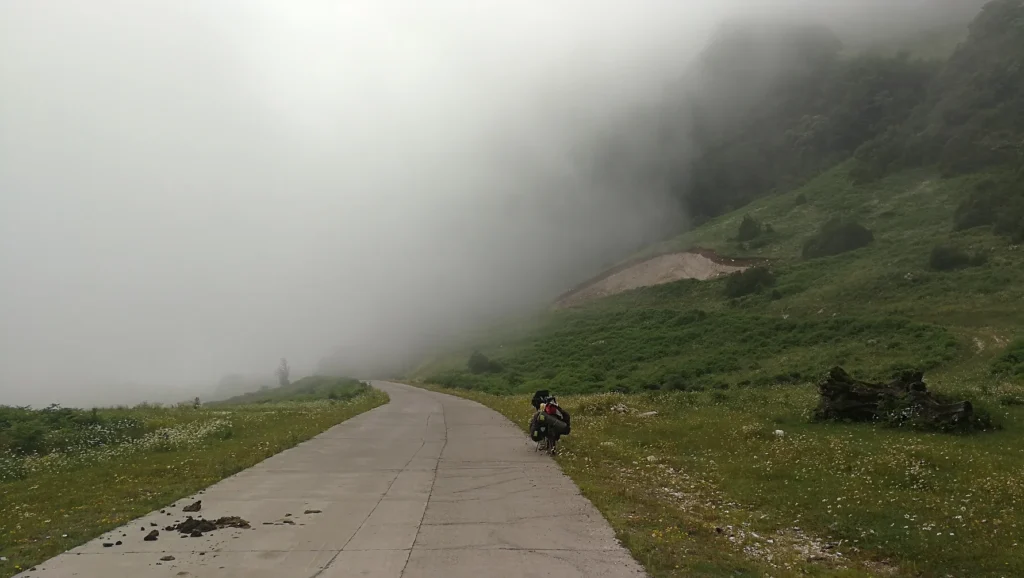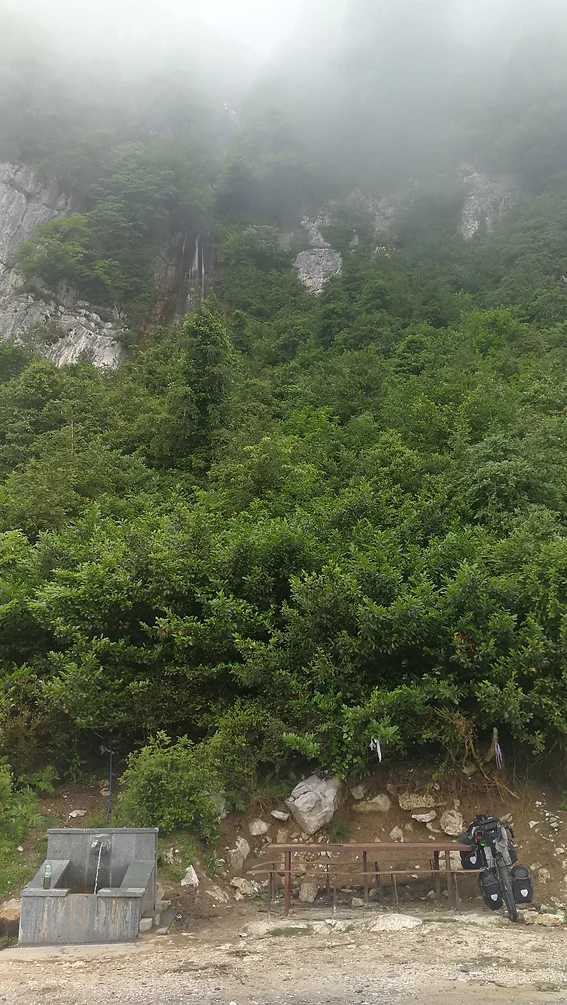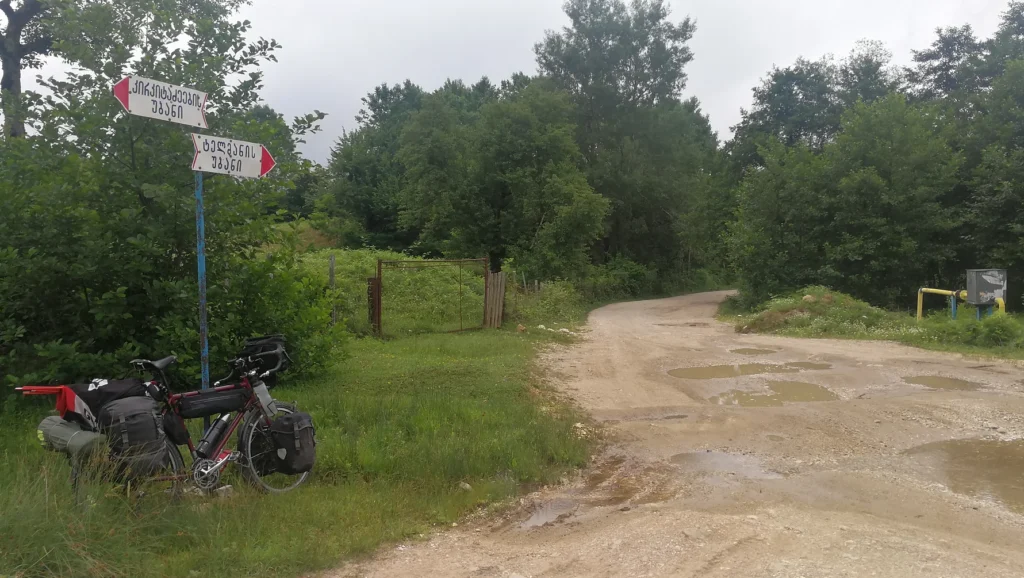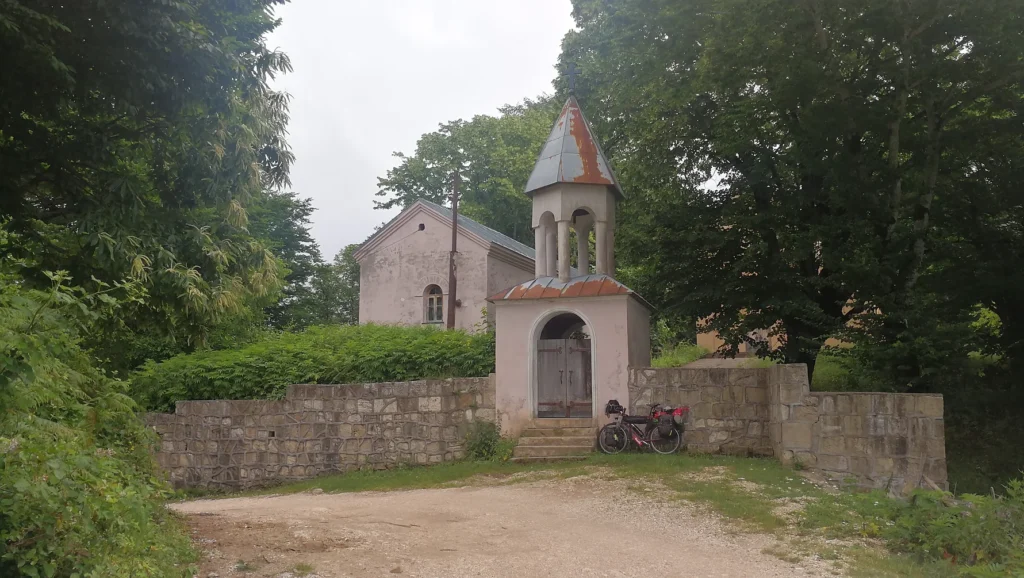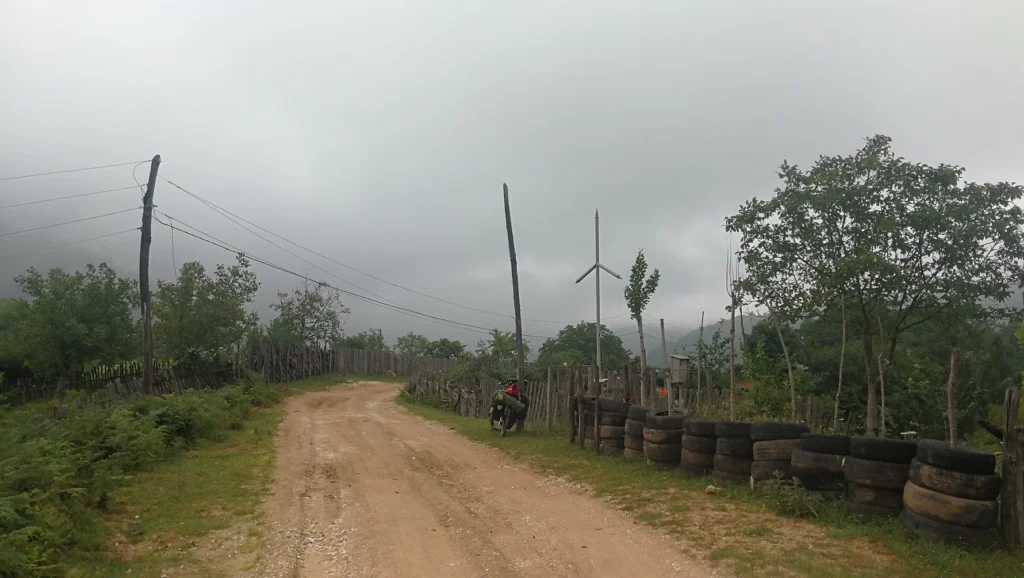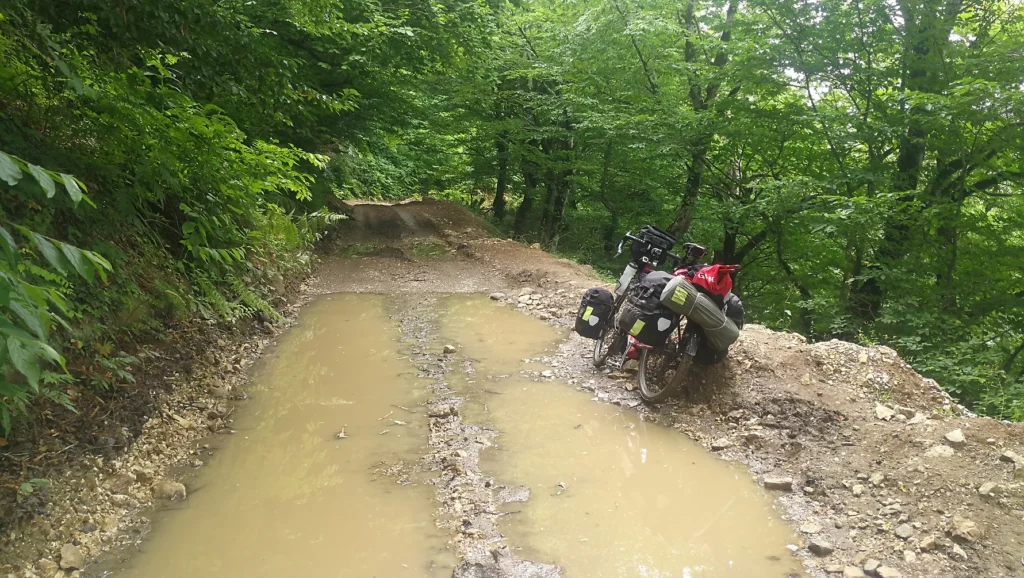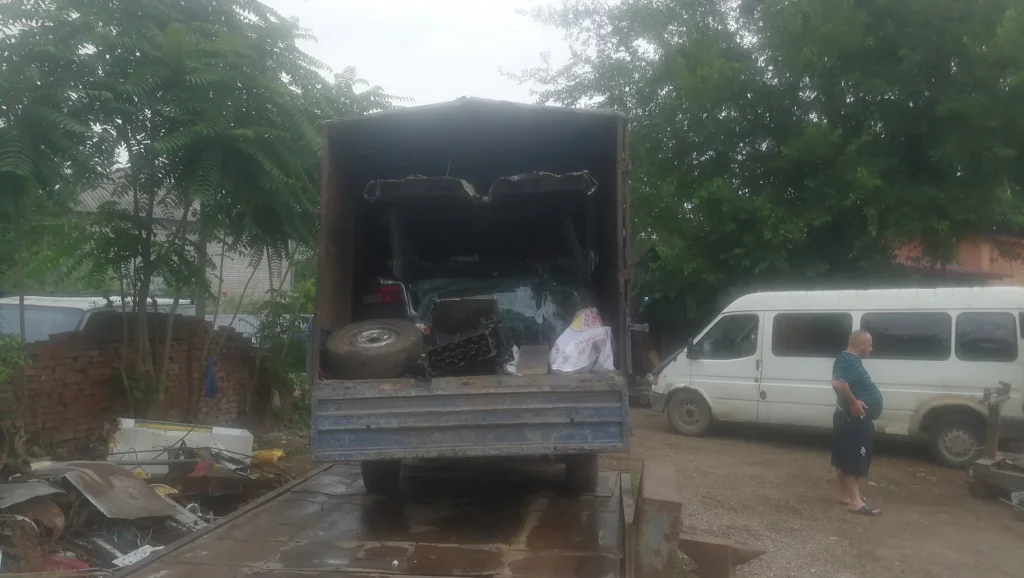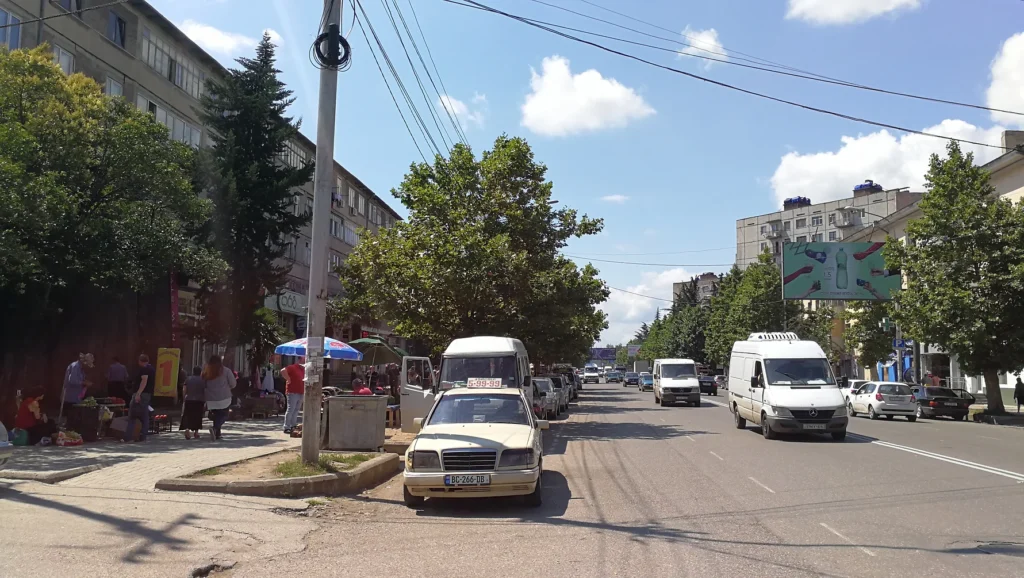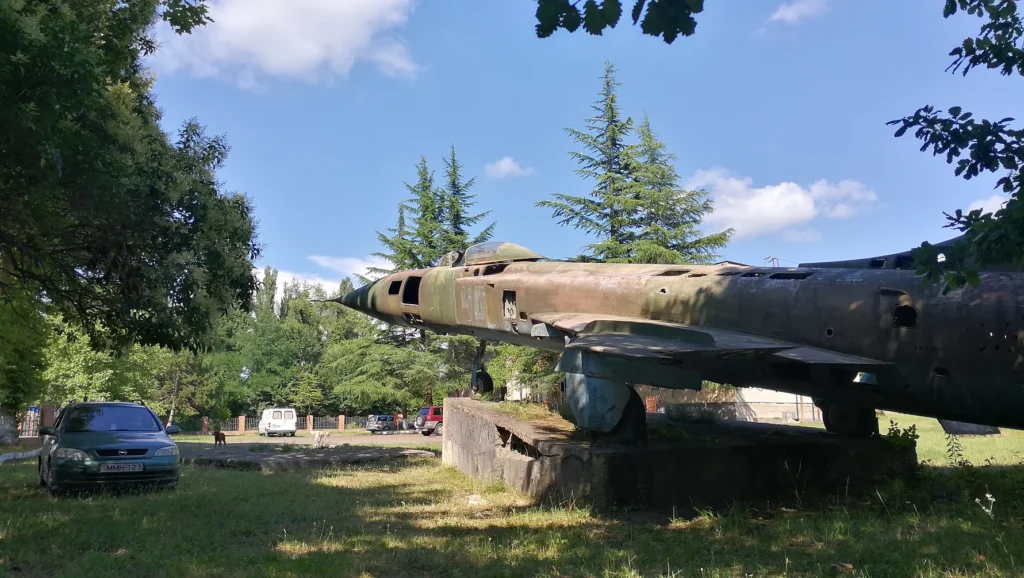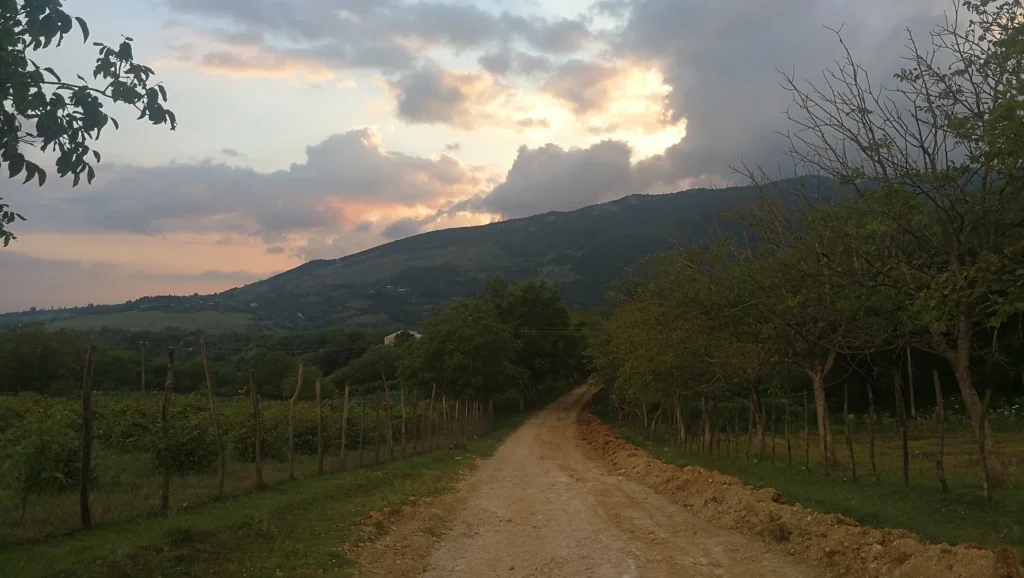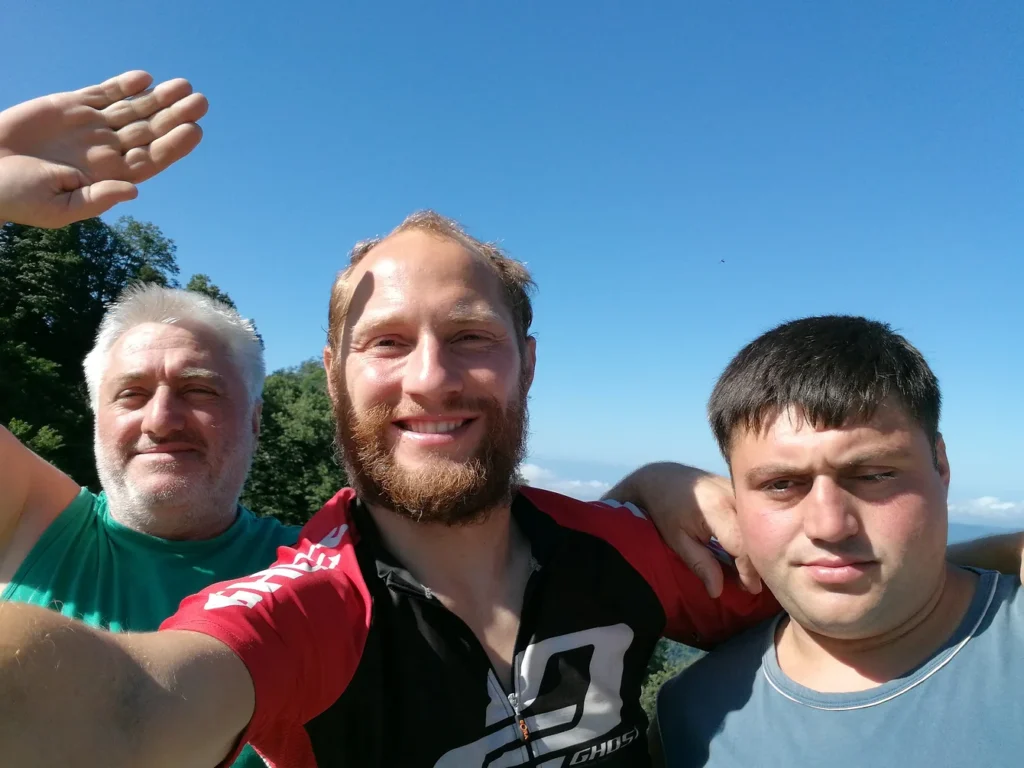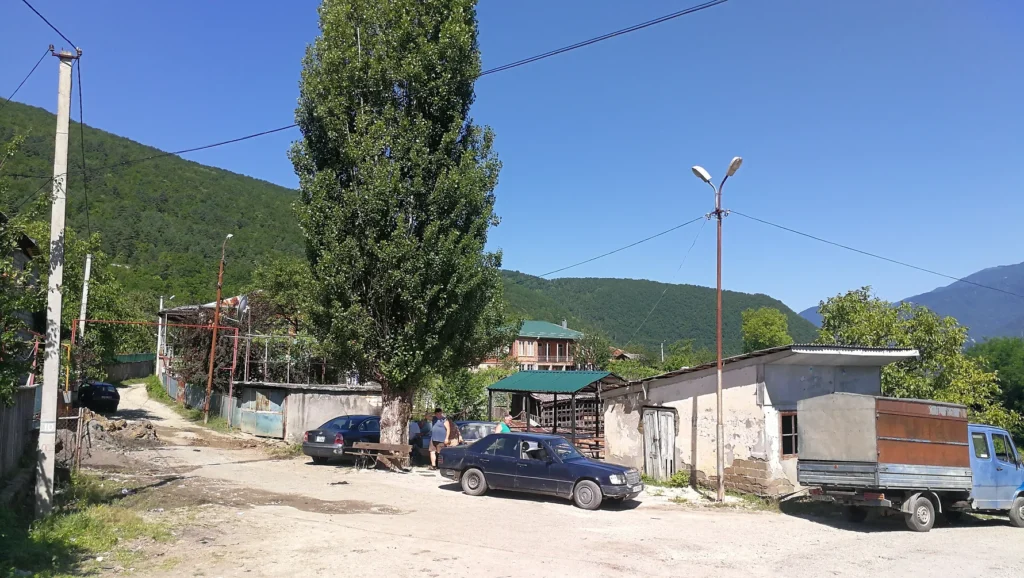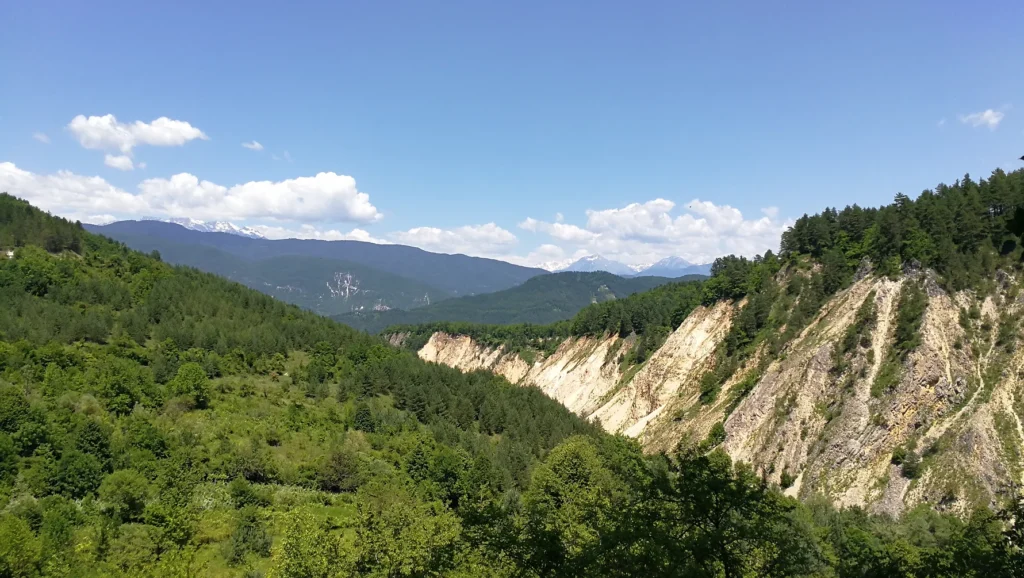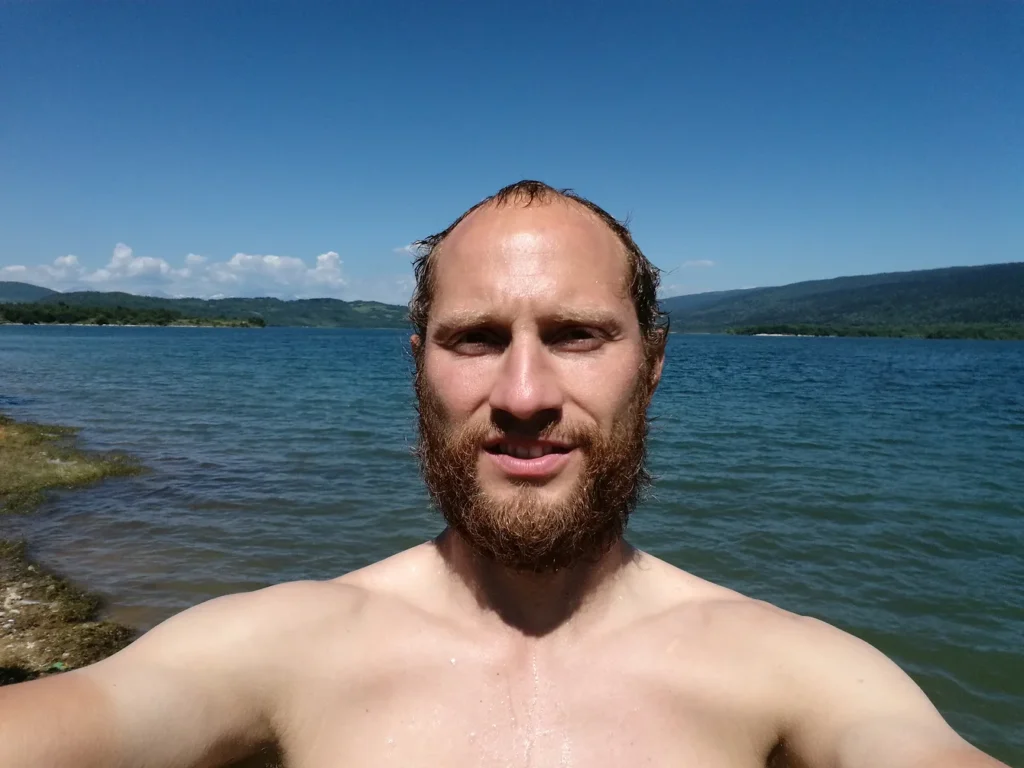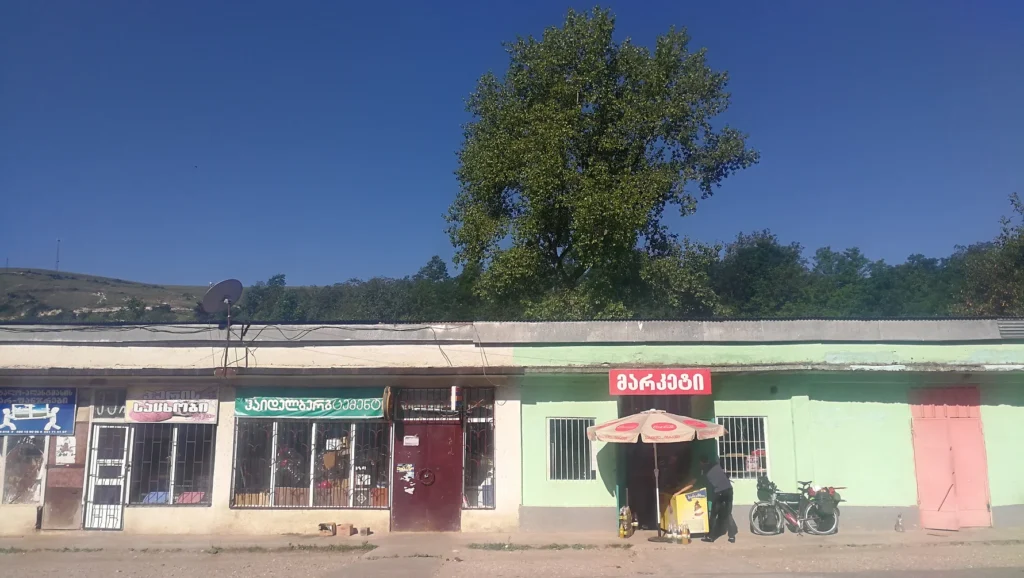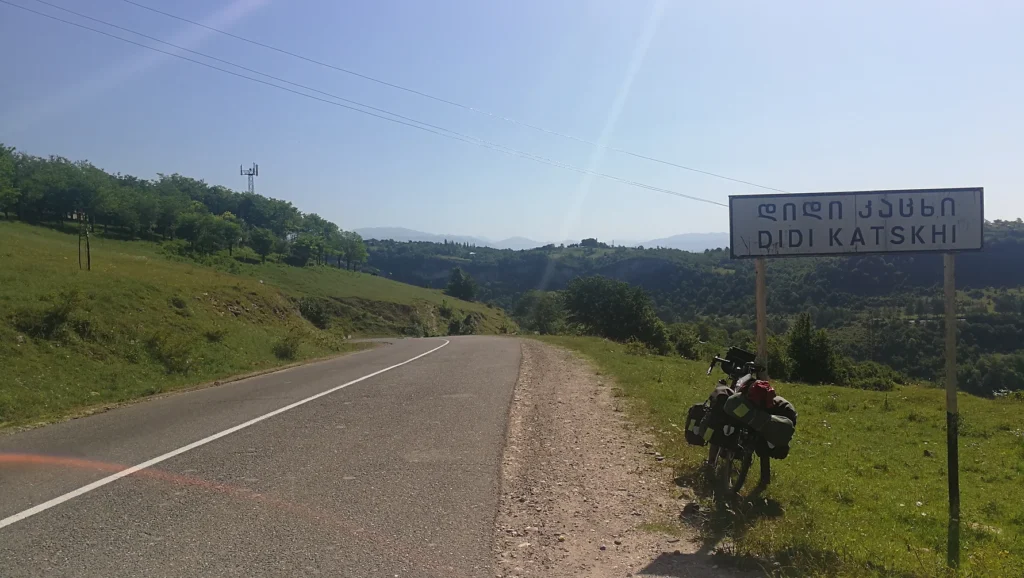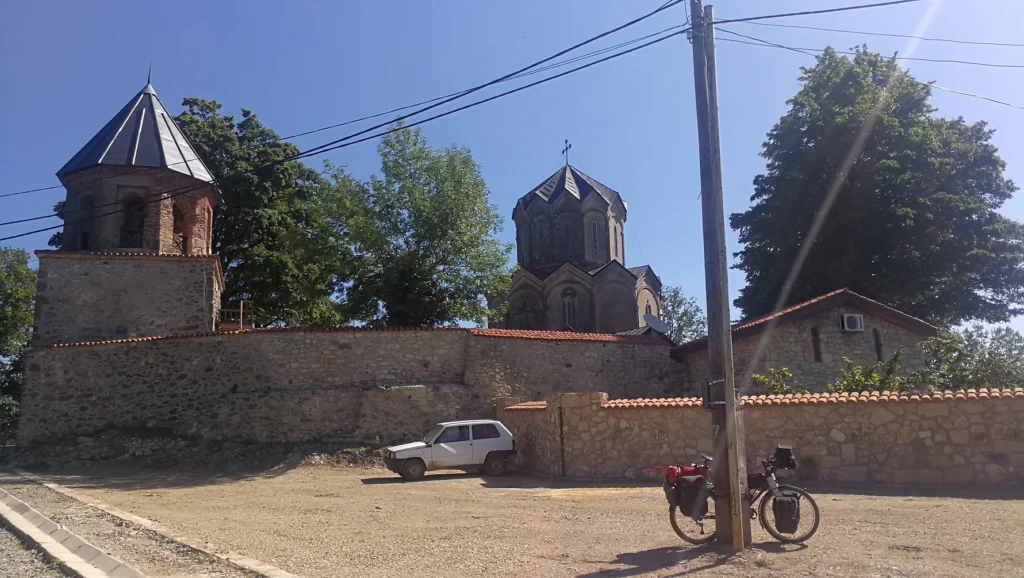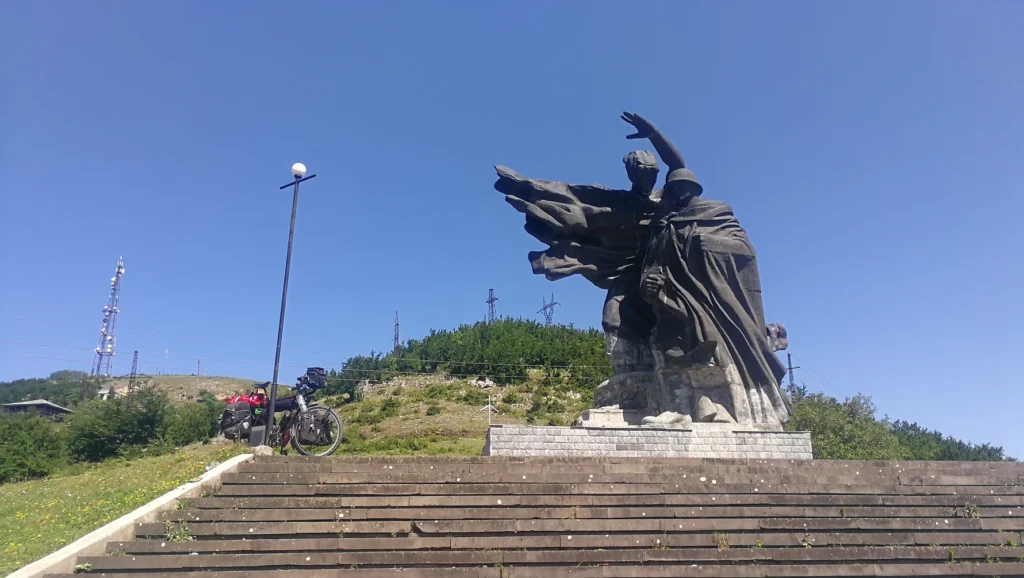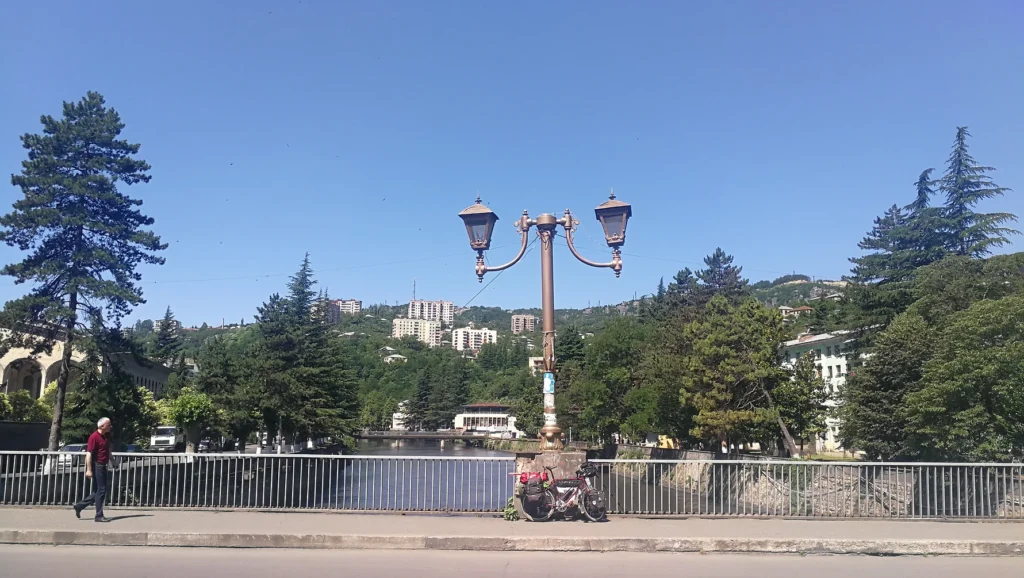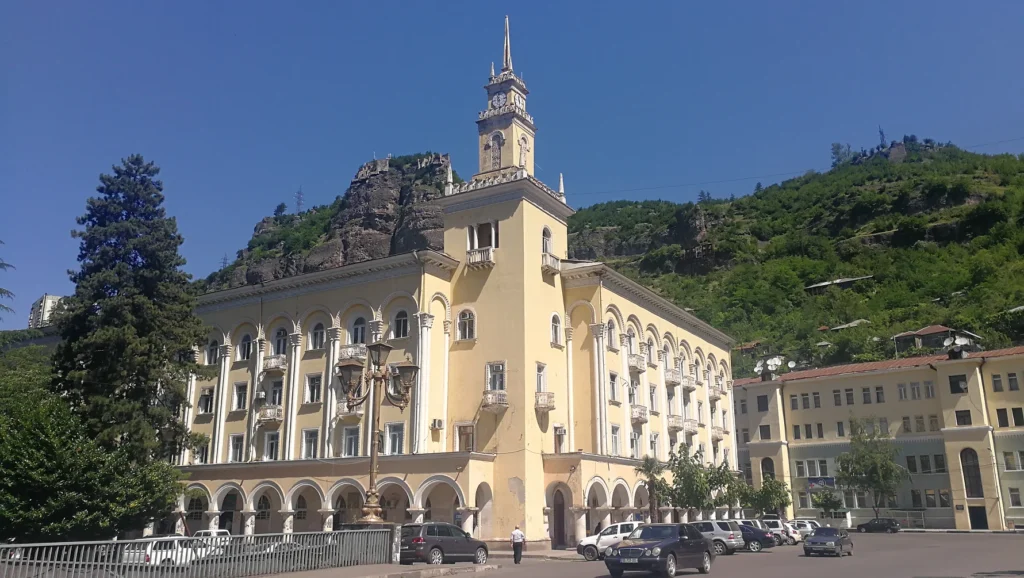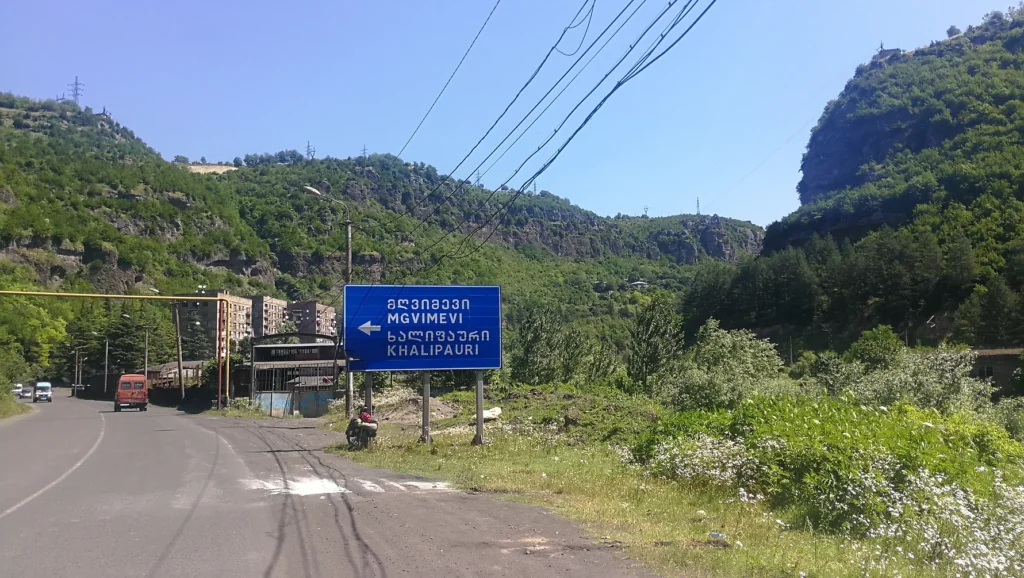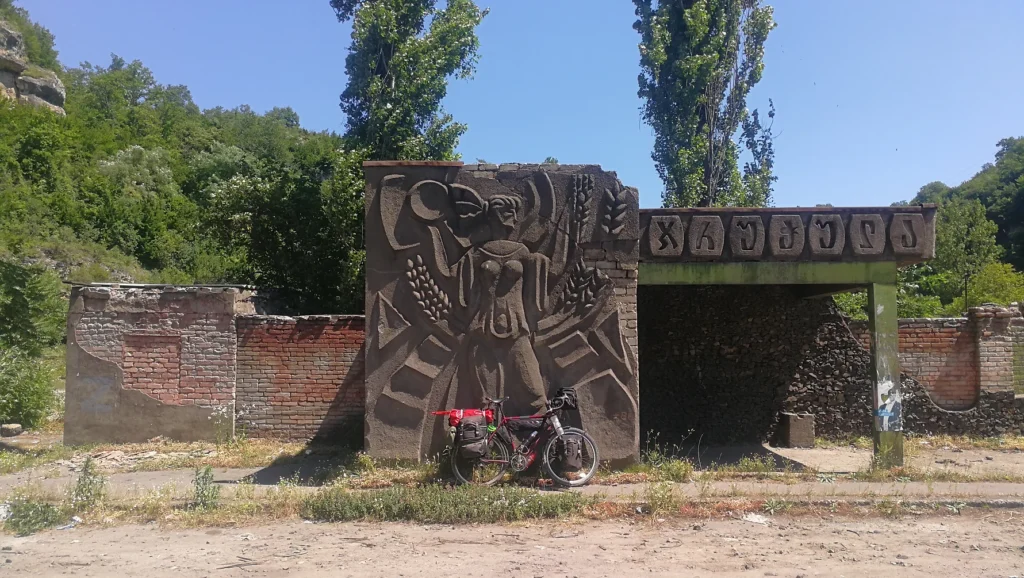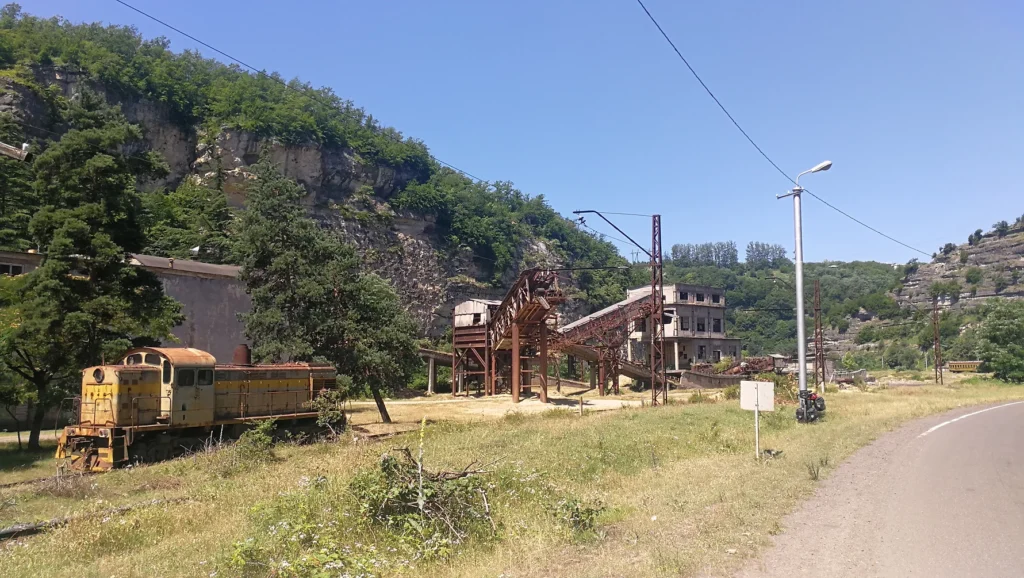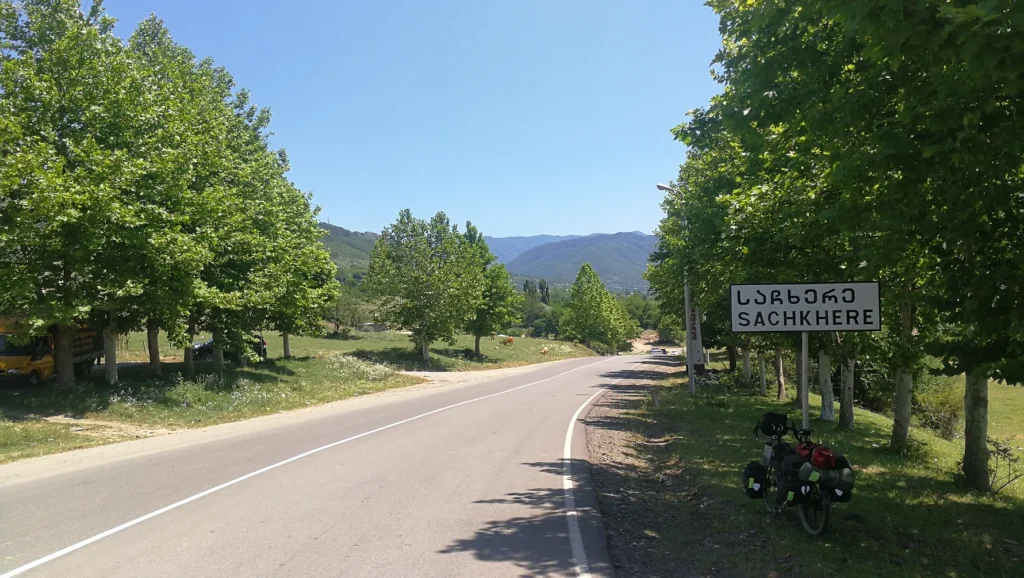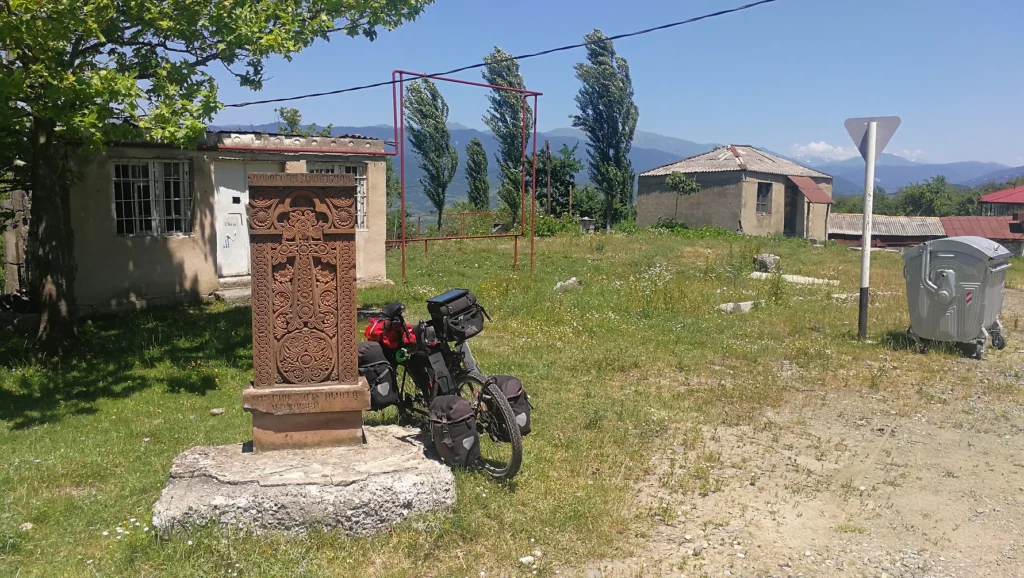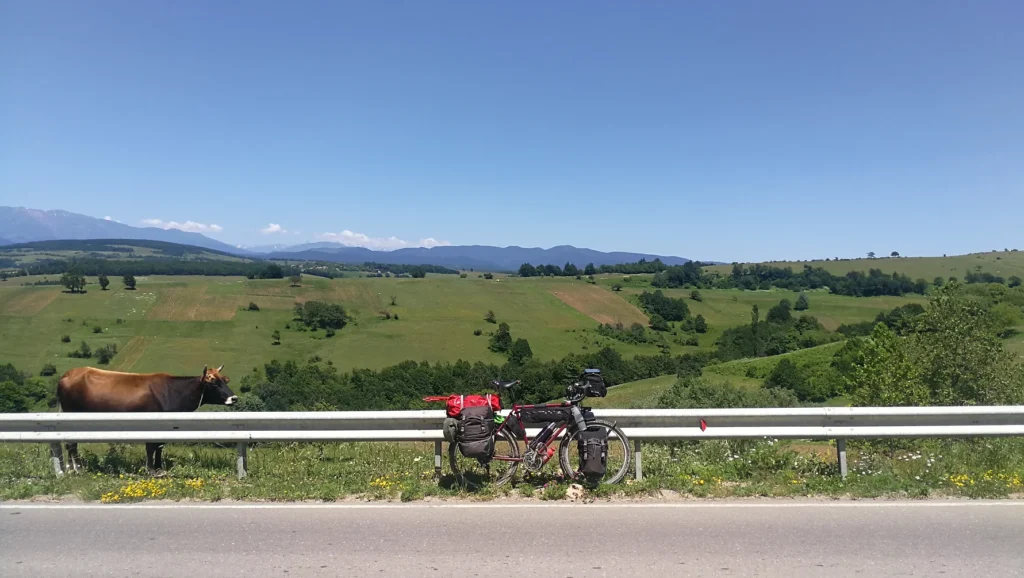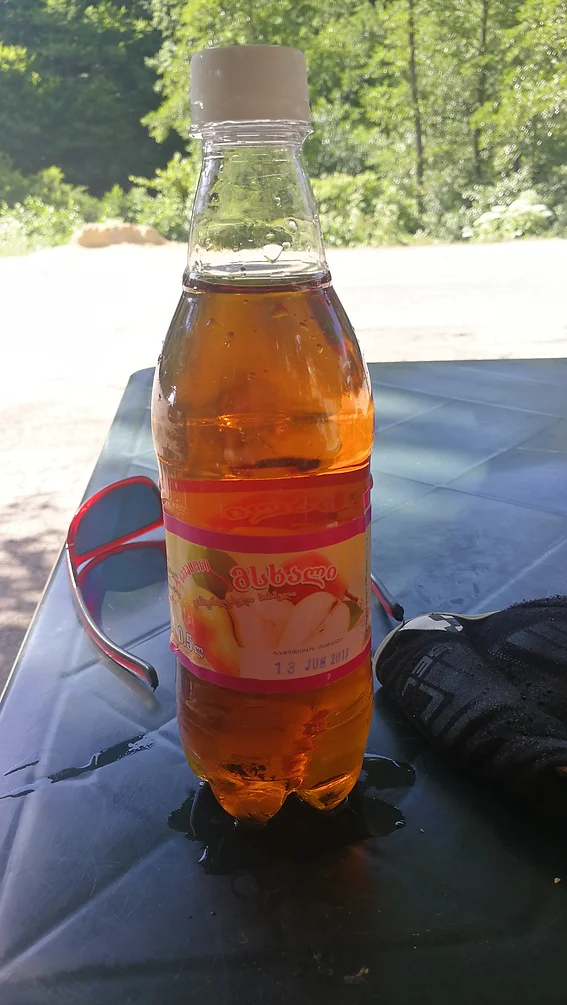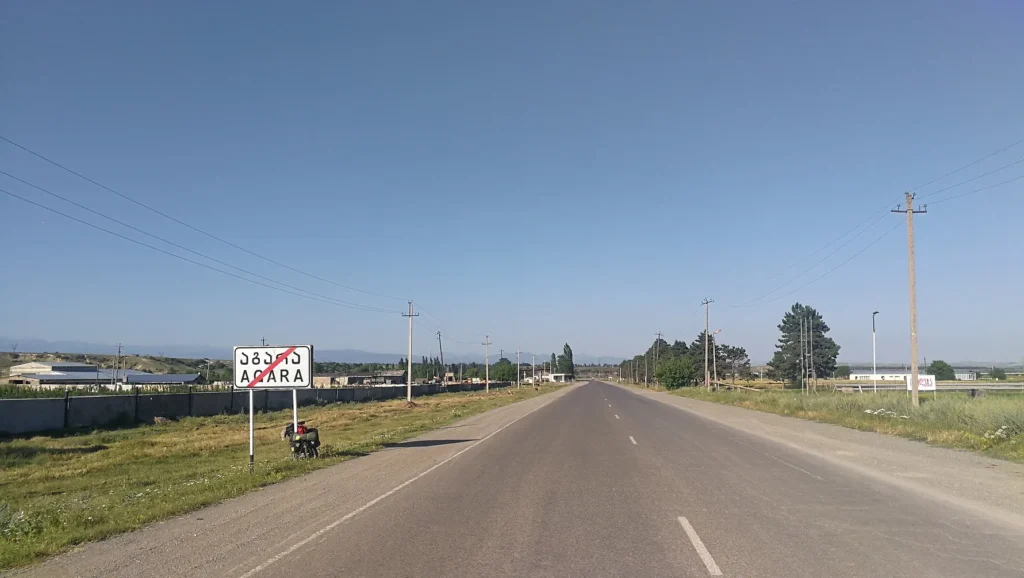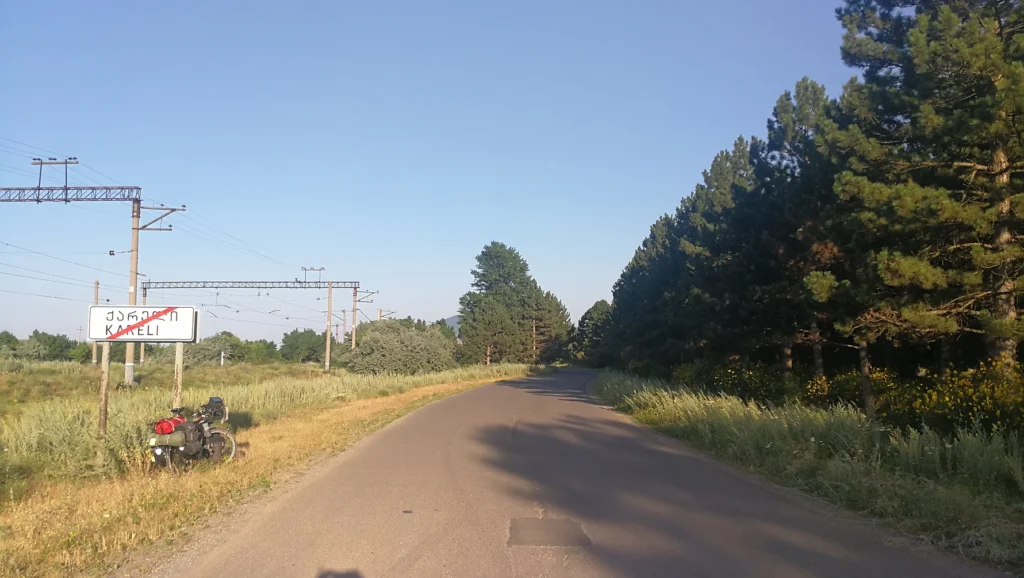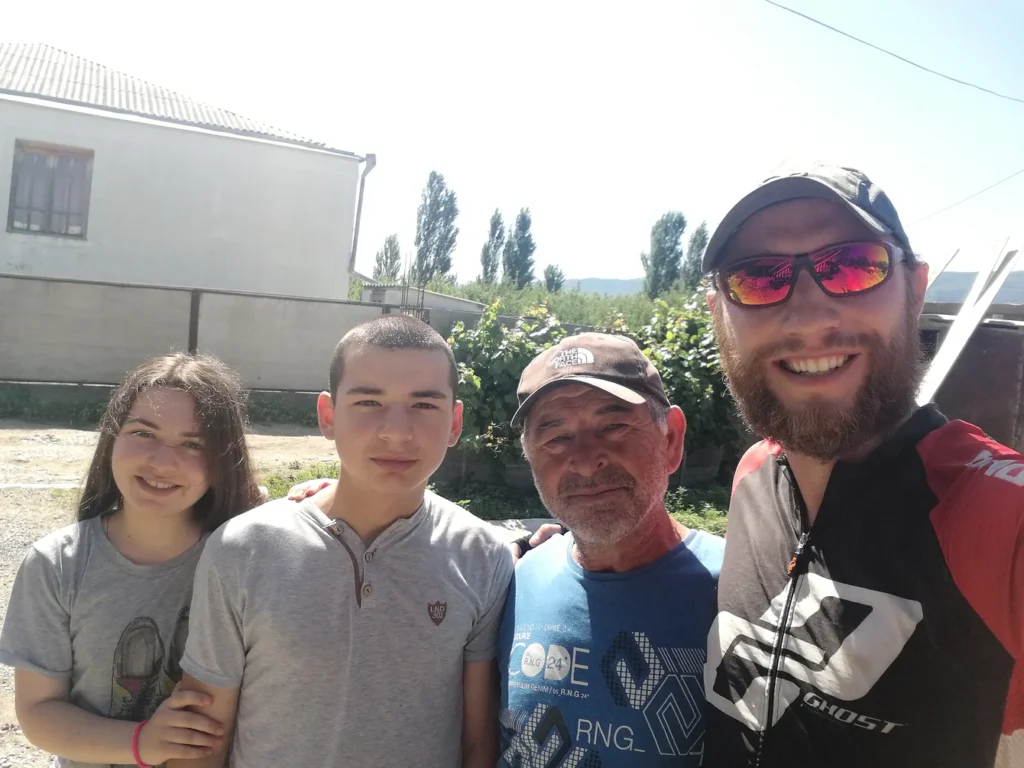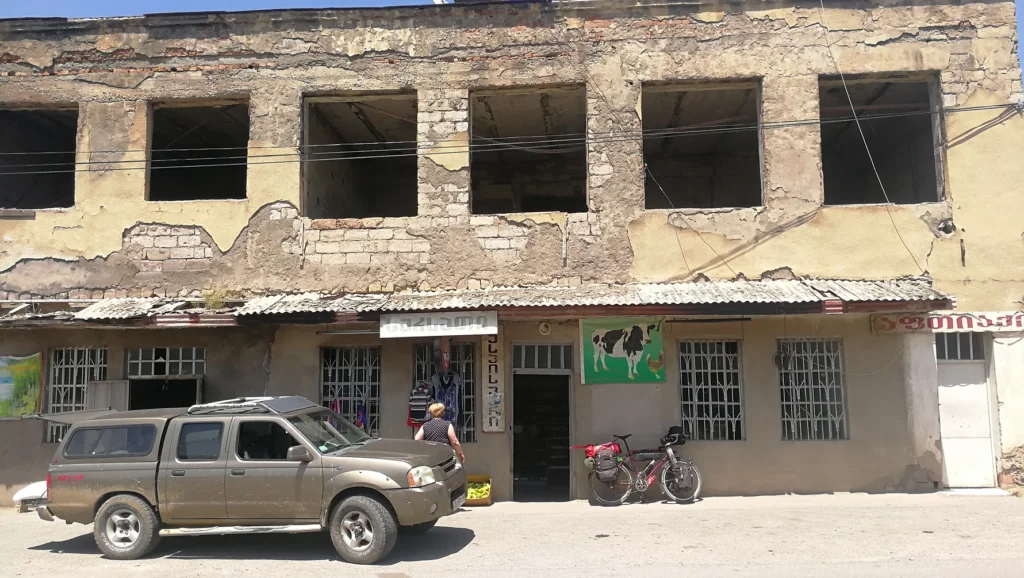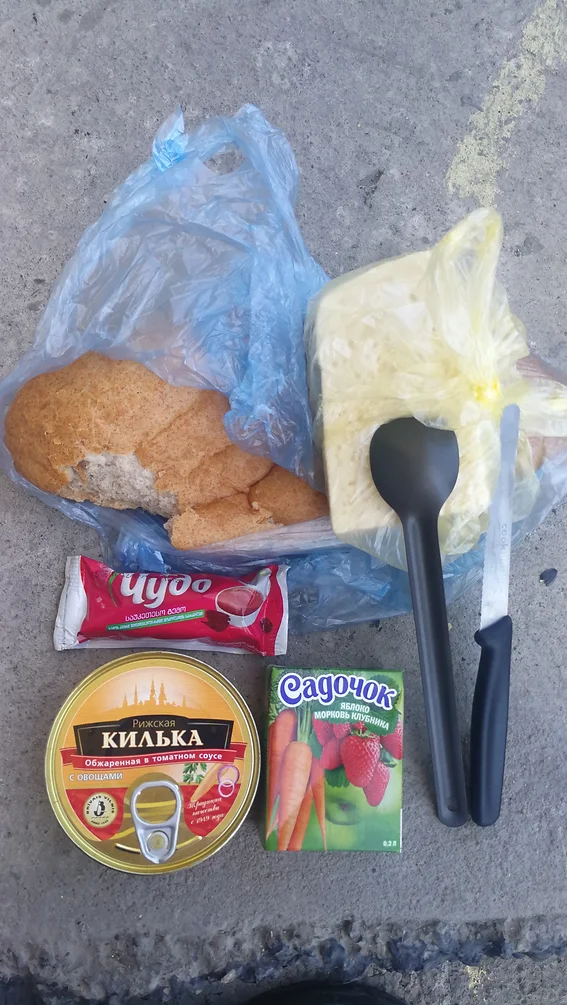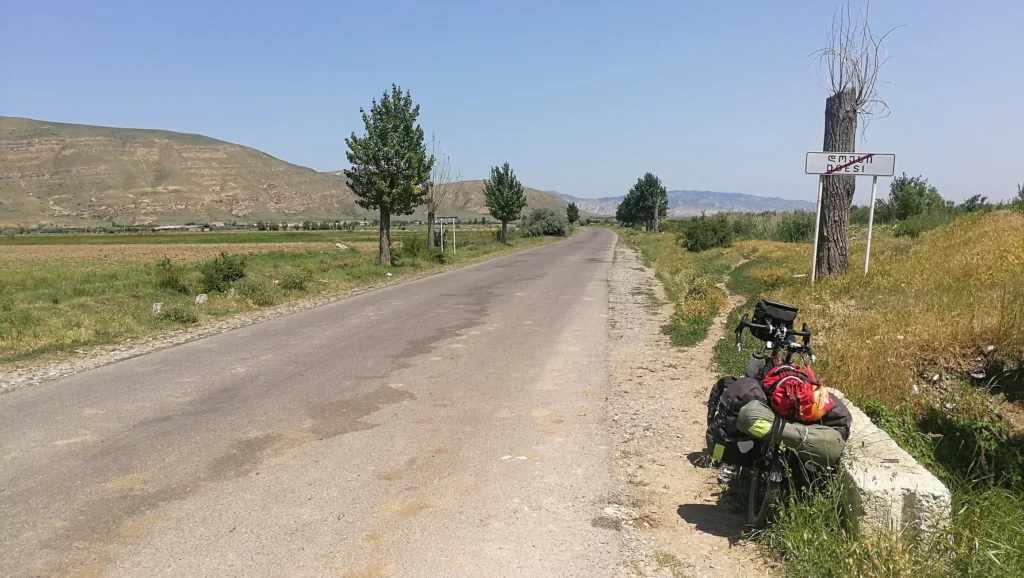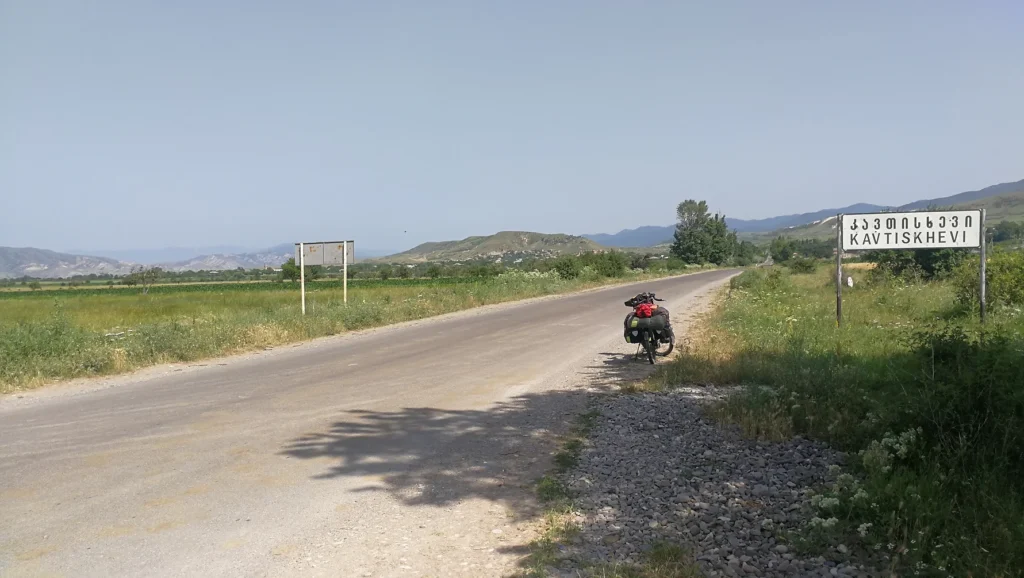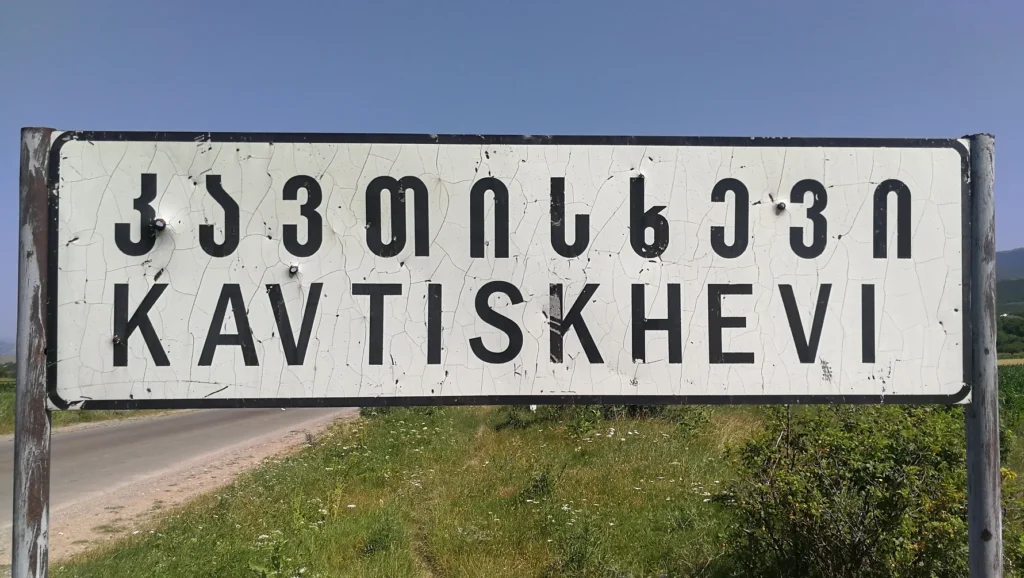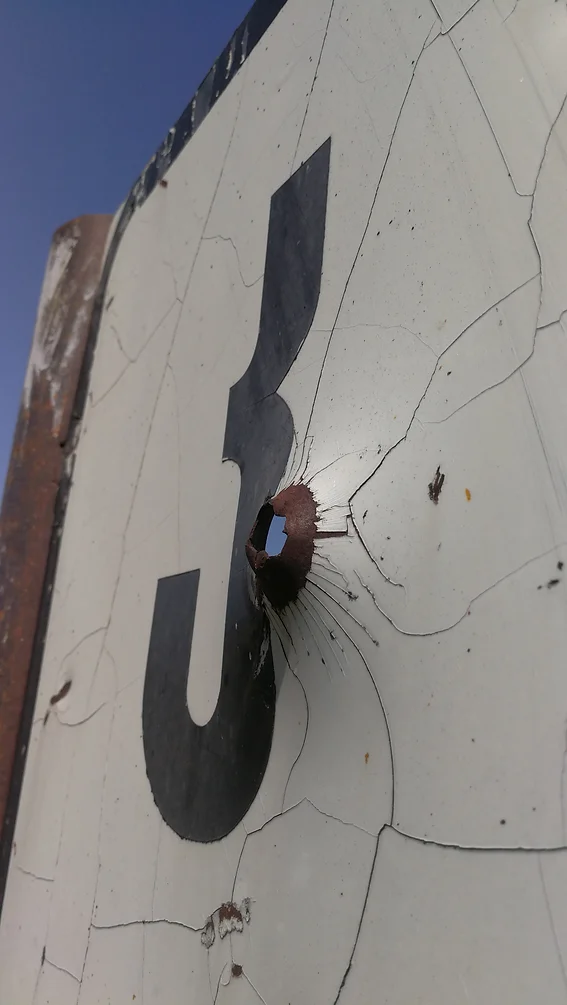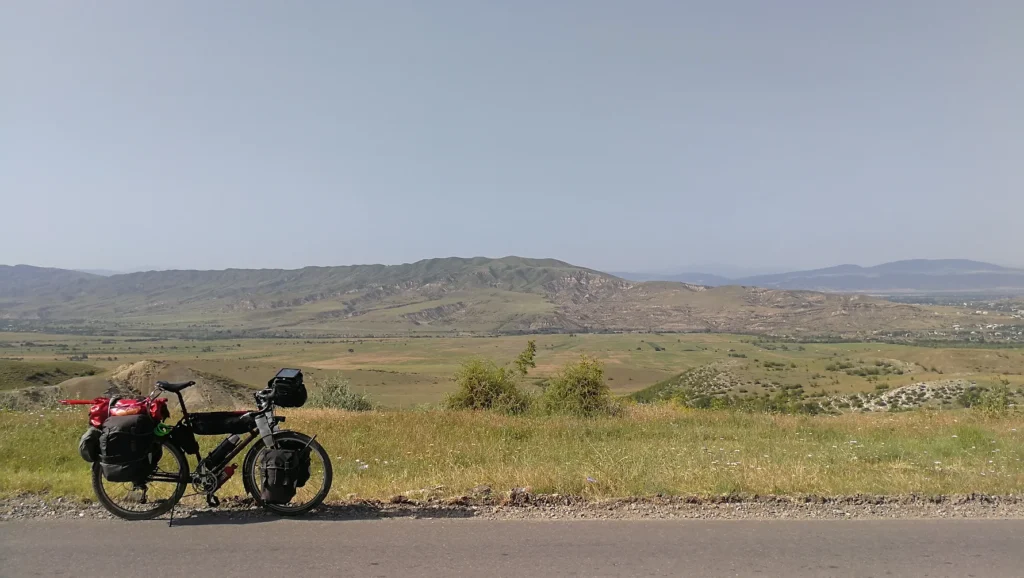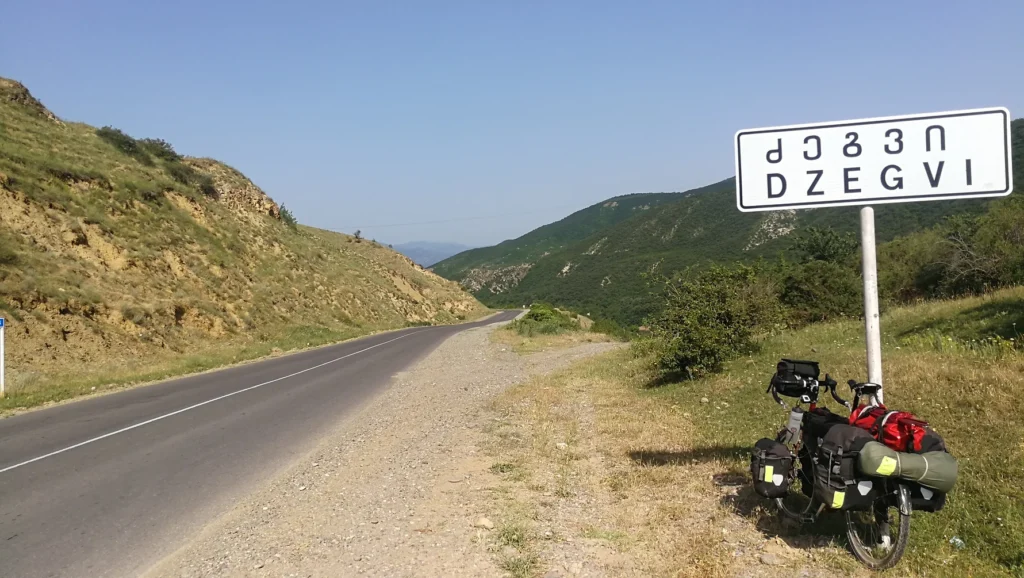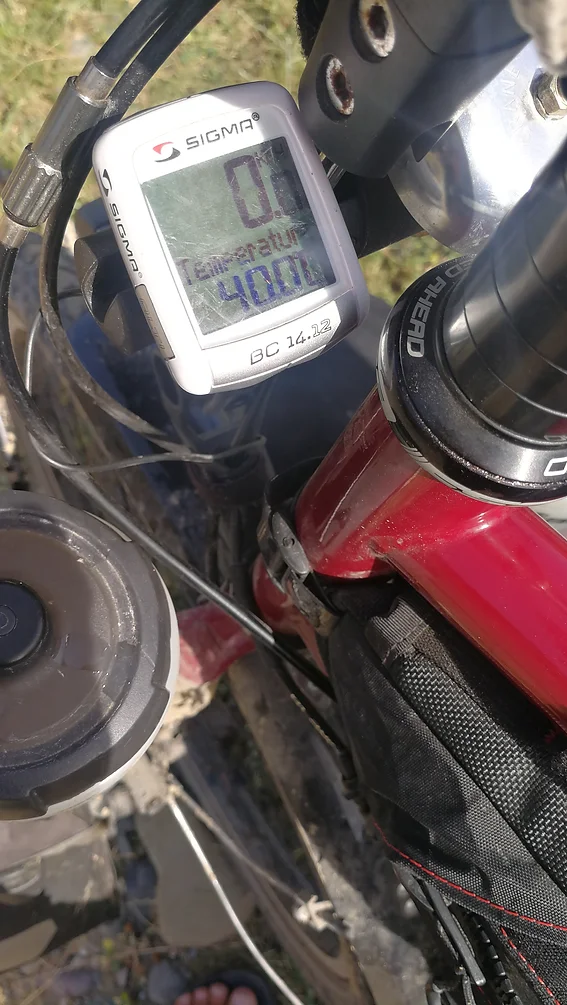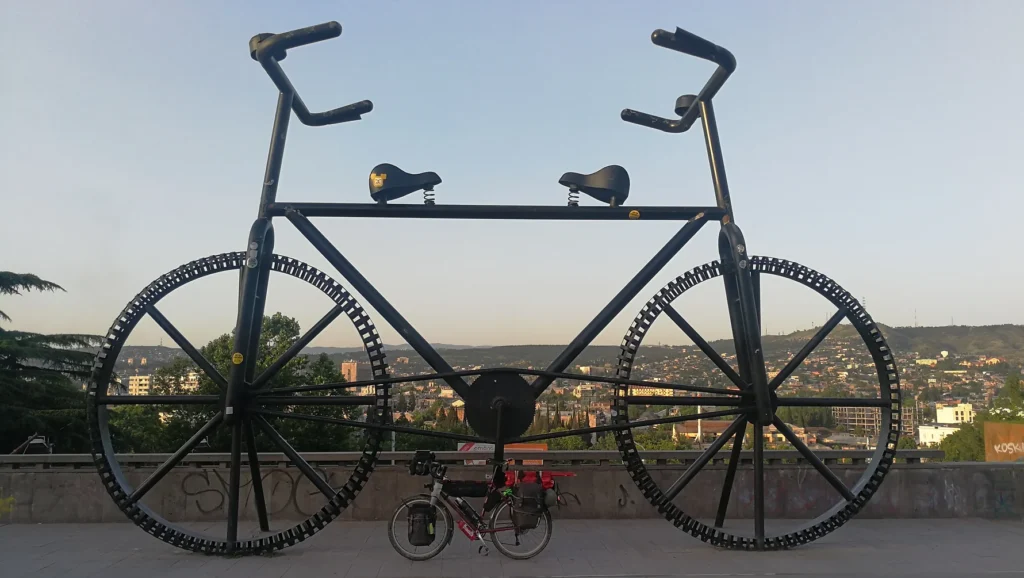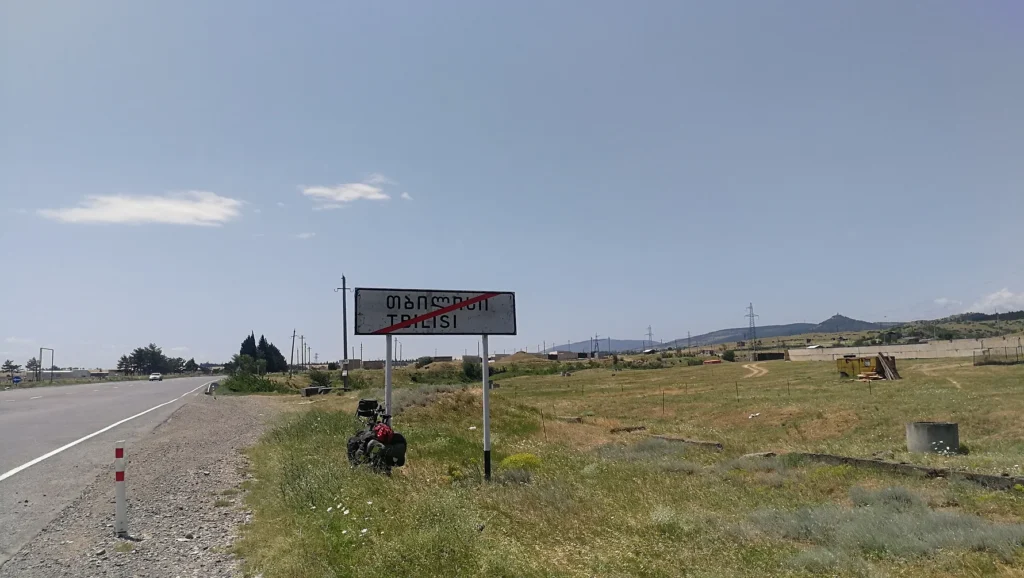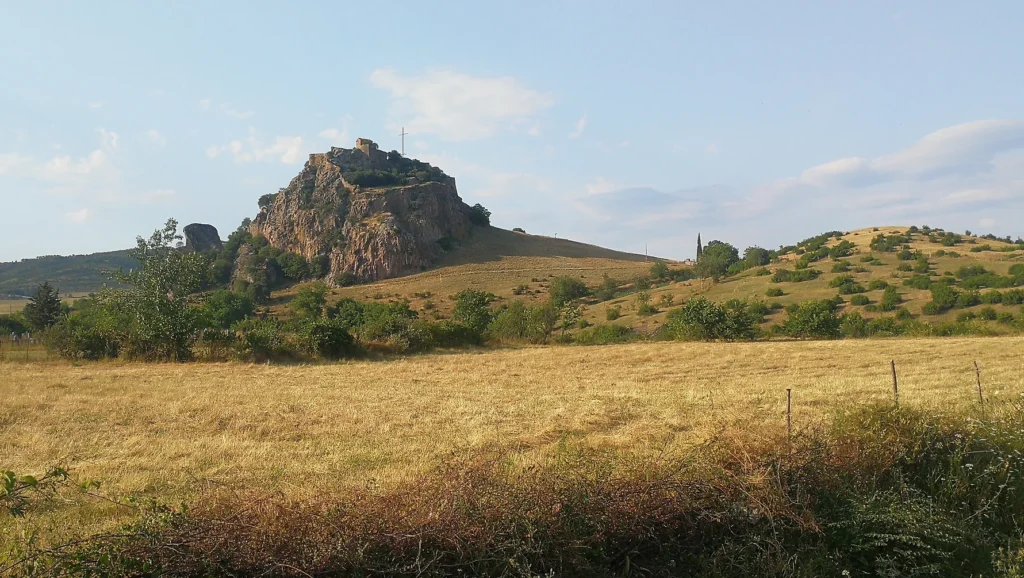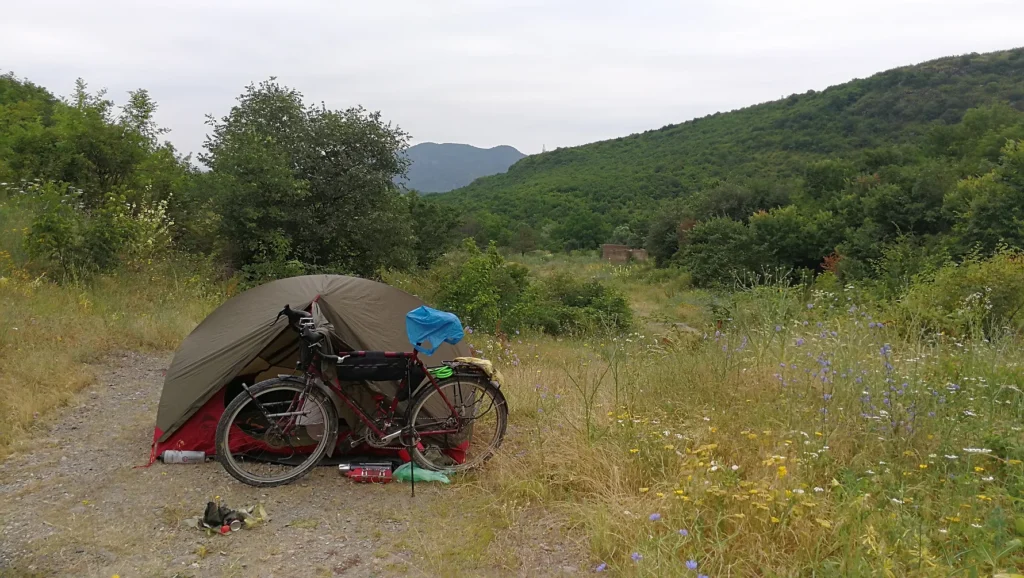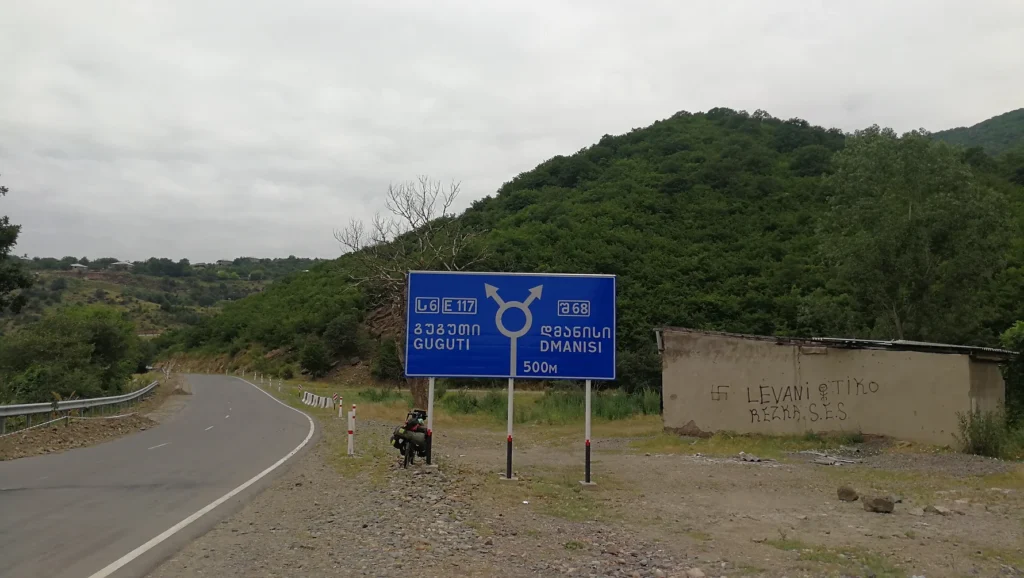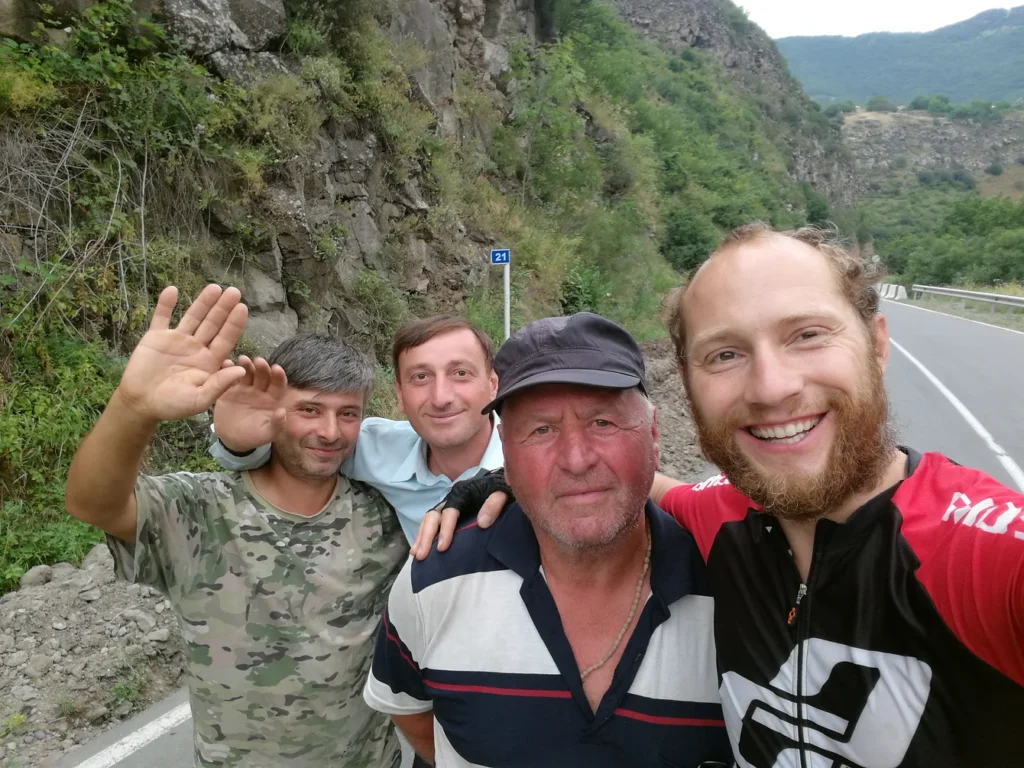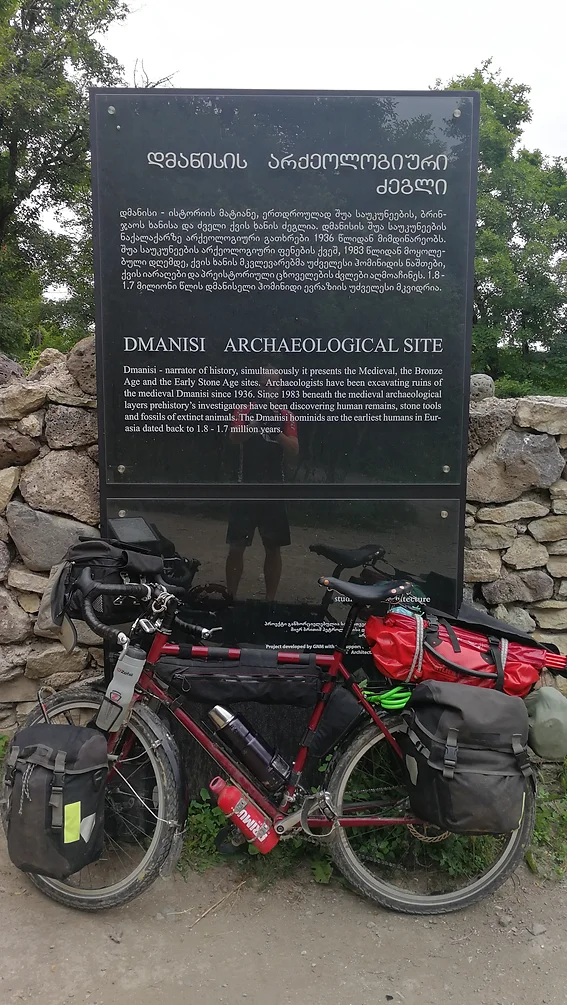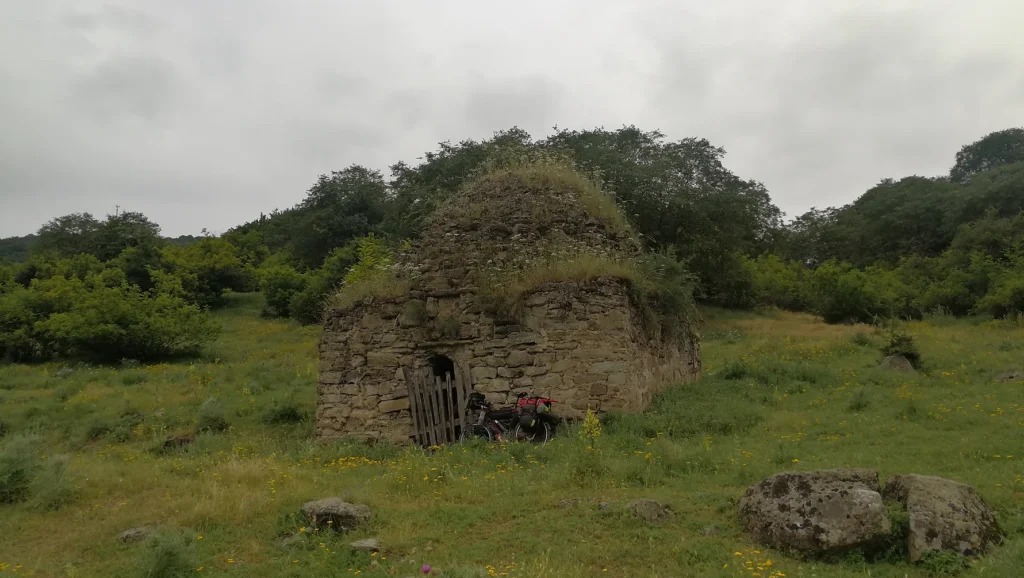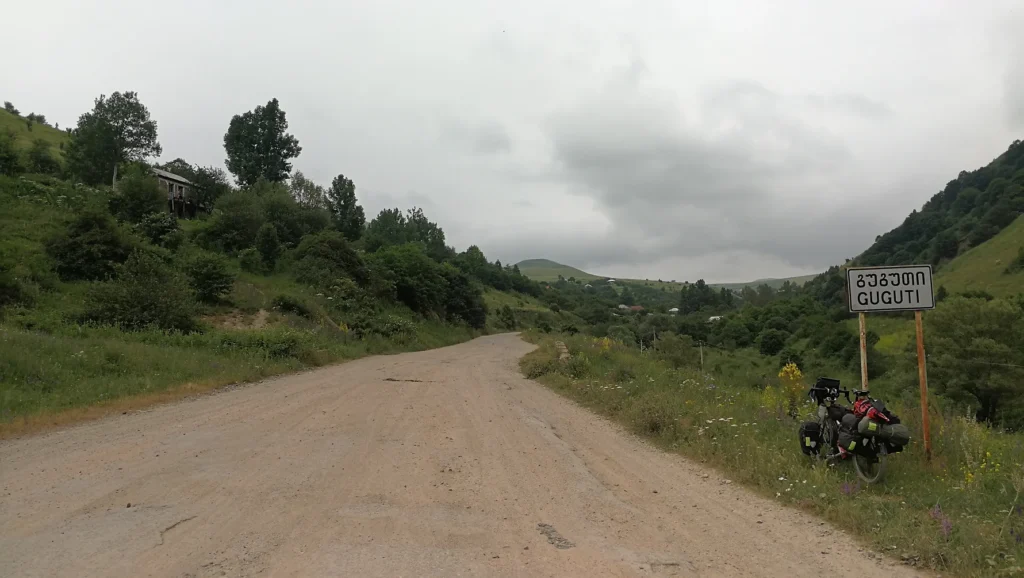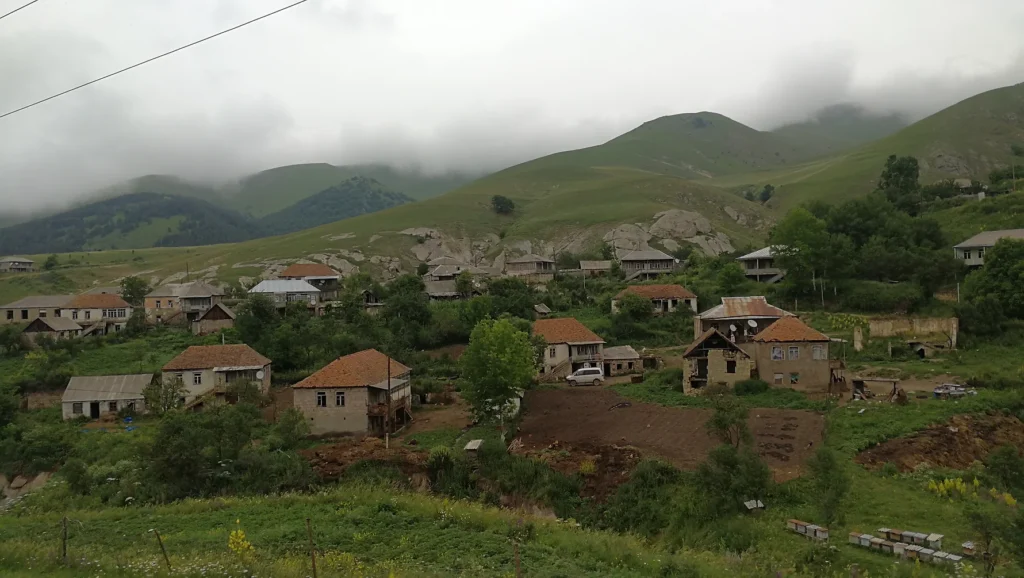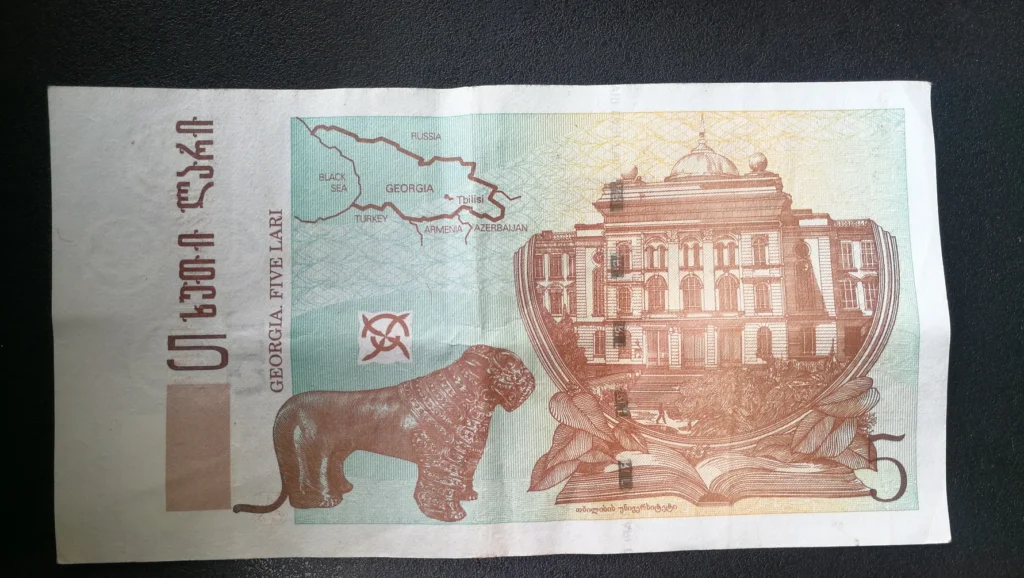Georgia — Courage
Before the border I cycled through several tunnels full of standing trucks, then around noon I crossed into Georgia.
Georgian is one of the oldest living languages and at the same time it’s not connected to any other language according to linguists. Nobody really knows where the Georgian language came from.
Wow, just look at the beauty of the letters.
Near the border is a waterfall where travelers can stop for a swim. Next to it is a statue of Saint Andrew who plays a central role for the Georgian Orthodox Church – he is believed to be the first-called apostle by Jesus who came to Georgia to preach Christianity.
Do you understand his hand gesture? Perhaps it’s a greeting, perhaps a protection, perhaps both.
I bought gasoline for my stove, crossed the Chorokh river, and entered Batumi downtown.
This country has a lively mix of tradition and modernity – I liked Georgia from the beginning.
On the northern edge of the city stands a 130-meter tall Alphabet Tower showing the 33 letters of the Georgian alphabet in a DNA double-helix structure. Pretty cool.
In the evening I cycled out of the city to find a camp spot in nature. I always download the entire country map of my current tour country which allows offline navigation – to my surprise in that offline map I saw a “camping” tag inside the Batumi Botanical Garden 10 kilometer north of the city.
Could that really be that they let you camp inside the Botanical Garden?
Yes, the friendly staff at the entrance said I just made the entry before they close for the night, I have to push my bike within the Botanical Garden, and the camp area is in the northern section.
While I’m generally a big fan of botanical gardens and visit one whenever I have the opportunity, this one stands out. It’s over 100 hectare large, follows the Black Sea for about 1 kilometer, and has a steep flank rising up from the coastline.
Here you can hike for hours and get lost in the wild garden parts – the plant diversity and overall beauty of this place are simply mind-blowing. Near the camp area you can go to a nice beach and at night you can walk around this paradise of a place for yourself.
The “camp” area didn’t look like many people actually camp here and beside me there was just a couple from the Netherlands.
The trust Georgians give you by letting you camp inside their Botanical Garden touched me – it’s worth something and an obligation to treat the place like home.
Do you have courage?
I’m sure you have, we all do – the only question is how we use it.
Courage is created inside our consciousness. In my view, courage is something we continuously generate through our chosen consciousness attention and actions, not something we “have”. And if that’s true, we are able to grow our courage by paying more attention to it in our consciousness stream – our reality-bending force can transform us forward any way we like.
But courage also seems to require something from us – trust. Life may or may not bring us pain, or joy, that’s an existential uncertainty of the human condition. Is that a risk or an opportunity?
Probably both, and probably having many different types of fear and courage on many different layers of our consciousness is normal – wherever we are and whatever we do in our life.
What can we trust in?
The answer will depend on our individual world conception. But across every human I believe it’s fair to say that we can trust ourself – existentially, our reality-bending force is always active inside us and we can always choose to connect more to it through our consciousness attention.
Existentially, our reality-bending force is perhaps the most reliable thing in the universe.
I decided to sleep another night in the Botanical Garden but went outside for some hours to explore the surrounding area.
Next time I will definitely enter Mtirala National Park. It’s located just some kilometers from the Black Sea coast and with an annual rainfall of around 4.5 meter (!) the park redefines the word green – it’s one of the wettest areas of the former Soviet Union and in 2021 it was classified as a UNESCO World Heritage in the category “rainforest”.
Cruising around on the unloaded bike in the sun, friendly locals open to chat, traditional Georgian food – this was a perfect recovery day and a day that was fun.
In the evening I watched the sunset at the Botanical Garden train station which doesn’t seemed to be used anymore.
Did you ever wonder how change processes really work?
According to most physicists the atoms of our physical bodies have come a long way: the hydrogen atoms in us probably formed shortly after the Big Bang when the initial hot plasma cooled down, the rest of our atoms probably formed through supernova explosions of stars. So basically you and I have physically been in the making since 13.8 billions years (if one believes this world concept).
Biologically we have come a long way too. You started your life as a single cell but as you are reading this your body has 28/36 trillion cells (female/male; adult average). A trillion is a lot …
And our consciousness?
Nobody really knows how it works … but perhaps language is simply not the right tool to understand it – what we all share is that we face a big mystery around our existence.
Mechanical, logical approaches to explain our existence are limited by the limits of our cognition. If anything, perhaps we can talk about our feelings when we let our consciousness expand.
I believe courage is something we can grow towards any uncertainty in life – including the deepest mystery of our existence. Can that even be fun and light and playful when we trust our existentially guaranteed reality-bending force?
The force is inside us.
Perhaps all we have to do is to focus on the next breath and the universe will keep unfolding with all its mysteries just fine.
100 days ago I left Berlin and now I was at the eastern end of the Black Sea heading towards Central Asia – with many little steps and repetition we can move large distances both physically, and in our consciousness.
In the morning I first cycled north along the Black Sea coast and then turned inland after crossing the Kintrishi river to find some elevation. Very diverse landscape, the coast has a tropical touch but as soon as you get higher the area feels alpine.
Soon I crossed from the Autonomous Republic of Adjara into Georgia’s Guria region near Ozurgeti – a fertile area where tea is grown as well as citrus fruits and nuts.
Georgia feels good – a place where people uphold traditions, a place were nature is valued.
Georgia and the Caucasus region have always been at a crossroad of empires. From 1902-1906 there was an own Gurian Republic in this region and a roadside monument reminds of the Nasakirali Battle in which local peasants successfully fought off Russian military forces.
In Nagomari stopped at a memorial for the victims of the 1992-1993 war in Abkhazia. Interpretations differ what Abkhazia is today but most countries worldwide recognize it as an autonomous republic belonging to Georgia, while a small minority sees it as a separate state.
The collapse of the Soviet Union and the massive Yugoslav Wars were in full swing in 1992 so the Abkhazia conflict remained mostly unnoticed outside the region. However, this complex conflict involving North Caucasian militants led to war crimes on all sides, and ethnic cleansing forced a 200,000-250,000 ethnic Georgians to flee from Abkhazia.
At the memorial I met a group of locals who explained me a bit of the history.
In Chokhatauri I restocked food and chatted with locals in a bakery. They were baking a traditional Georgian bread called “shotis puri” by sticking dough to the inside wall of a large round oven with a fire in the middle.
One thing you see in Georgia a lot are animals on the road – the animals and the traffic get along in natural harmony.
Note this pig’s anti-through-fence device consisting of a horizontal stick mounted to its neck. Like that the pig has to stay on the road area and can’t go into the gardens.
If you were a cow and could chill anywhere, would you pick the road? Perhaps you would.
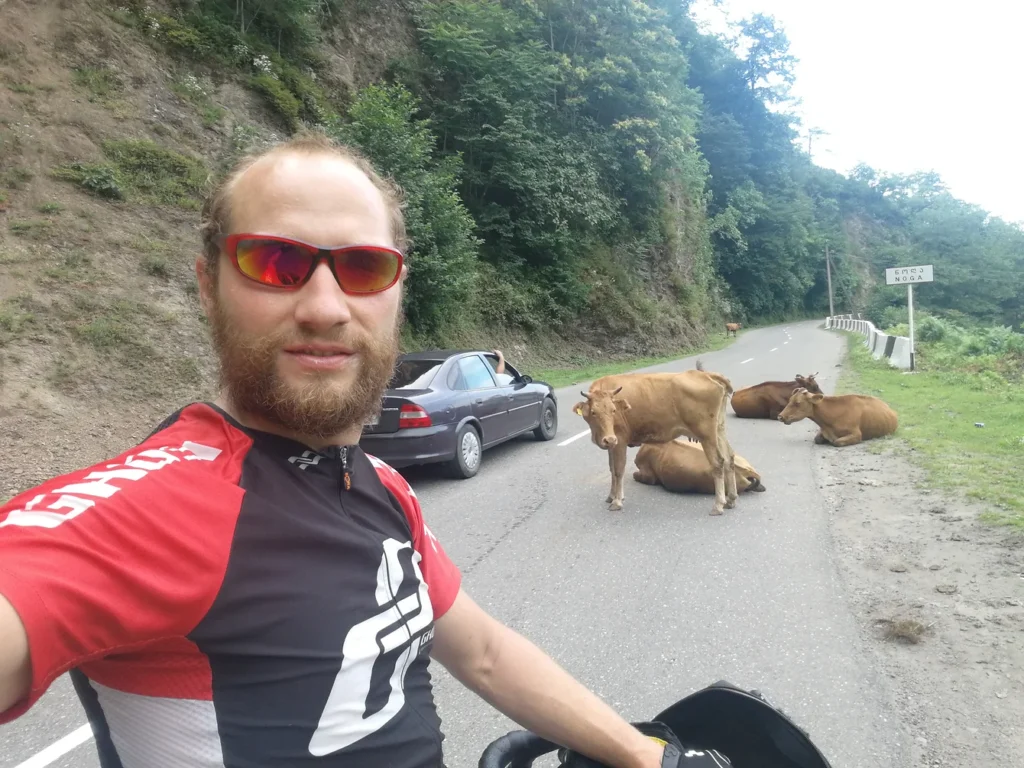
In the peaceful countryside it’s easy to forget about politics. How would our world look like if politicians and military leaders did more consciousness reflection before acting?
I believe the degree of individual consciousness reflection makes a big difference in conflicts. Wars seem to turn particularly ugly when participants are unclear why they fight – blurry nostalgia ideas, blurry ideological ideas, and mixed feelings of revenge, pride, fear, and arrogance are all no good reasons to go to war.
The other way round, when humans are reflected with mental and emotional clarity they can see themselves in a larger context and peaceful solutions can be found – like at the end of the Cold War when Ronald Reagan and Gorbachev figured out together that a superpower arms race should be left behind in the mutual interest of everybody involved and the world.
It’s ironic that humans shed so much blood for independence of geographic regions while true independence is found inside ourselves – as humanity we should be able to change that, right?
I’m just a cyclist but making courage for more individual self-reflection something we cultivate inside seems pretty doable for humanity if we choose so.
In the evening I cycled into the large flat plains in Western Georgia and pitched camp at the Rioni river which flows from the Greater Caucasus to the Black Sea. The camp spot in the grassland was calm but there were so many mosquitos that I skipped cooking.
How does courage enable personal growth?
While there are countless ways to use our courage to improve our lives, perhaps a key area is having the courage to allow us to truly feel our emotions – the joy, the pain, and everything in between waiting in our subconsciousness for us to be felt.
The emotional blockades you and I have inside are perfectly normal – everybody on this planet gets hurt by life and everybody works on emotional integration lifelong.
Courage to feel our emotions is natural. Wherever you are and whatever you do, dear reader – you are already at the right place in your life to feel your emotions and you already have everything it takes to let yourself feel.
Not all at once, of course, and the big blockades take time to integrate. But you can always start and make a little bit of progress with your emotional integration – you can do this today, now, it’s a natural capacity you have inside.
While it takes courage to face our deepest emotions, at the same time that’s probably the most rewarding way forward in life.
Looking deeper into connections between our biography and our life choices works better when we generate courage in this direction.
And looking deeper into connections between our physical reality and the formless world also works better when we generate courage in this direction – whether you believe in spirituality or atheism.
In both cases, generating courage requires self-trust – trust in the reality-bending force we all already possess in our consciousness.
What if we say “yes” and simply do it? Courage manifests in the doing …
Breathing in, breathing out.
In Kutaisi I met two gentlemen who both had the name George and with my name Jörg being a short version of George and us three being in Georgia, we had a good laugh together.
Studying my map closer I realized that I should have looked at road options in the Greater Caucasus earlier. Next time I will head up to Khaishi and then cycle a loop over Zagari Pass.
The 2008 Russo-Georgian War in South Ossetia, widely regarded as the first European war of the 21st century, also didn’t help. South Ossetia is now a large area under Russian control in northern Georgia where you can’t enter – restricting cycling a west-east line along the Caucasus range.
The smallest roads were not shown on my navigation apps so in the end I decided to just cycle northeast to Tkibuli and take it from there.
Tkibuli is a coal mining town in a region with the largest coal reserves of Georgia. This is also a region with mountain tea farming.
When I briefly got lost I met some locals who showed me the way towards Mukhura. They were surprised seeing a foreign cyclist but were extremely friendly and gave me a bag with fresh fruits as a present. Positive, cool people.
Have you ever cycled on a road in complete silence?
Sometimes on the bike tour you stop somewhere and don’t even hear an insect. If you then close your eyes and you breath calmly, you can feel your consciousness expand into your surrounding area much quicker than if there are audio or visual distractions for the brain.
I pitched camp at a peaceful forest clearing as I could hear a creek nearby so I assumed to have easy water access. It turned out the water was flowing unreachable under rocks so I had to stretch my tiny water reserves over dinner and breakfast – thirst makes you value water more.
Given that according to most world concepts we only have one life, at least in our current biological body, and given that our time on earth is limited – how do we make our life count?
Having courage is constructive when you only have limited time for something. And it’s not just that we grow earlier as a person whenever we choose self-trust over doubt – we also feel better earlier in life when we choose to be ourself.
Having the courage to let our feelings arise from the edge of our subconsciousness into our conscious awareness and holding them there, especially when what’s arising is fear and pain, is the only way to truly become integrated, to become authentic.
Emotional integration is of course easier said than done … the reason it’s a lifelong task for everyone is that it’s tough. But then again nothing holds us back as there is no authority in our consciousness stopping us from transforming forward any way we like – the force to do this is existentially already inside us.
Yes, we could run all over life, hide behind superficial pleasures and distractions, and never really find out who we are. But there is the fundamental life risk that we may deeply regret this later when we look back at our life and realize that we have never really been ourself.
Do you want to experience having real courage at least once before your die? You definitely can, dear reader, wherever you are and whatever you do.
The fears you have inside are perfectly normal – everybody has them, just the details differ. And your fears are not going away if you don’t face them – the way to practice and experience real courage is to accept your fears.
Facing our fears earlier means we have more lifetime left after having overcome our fears – so why not start today, at least a little bit? You could start with 10 seconds …
When we trust ourself today and we make one baby step of fear integration, we have done the most difficult part of the journey already.
Breathing in, breathing out – we are here, we are ok.
In the morning I cycled over a small pass in dense fog and almost complete silence.
I found a spring channeled from waterfall above and was happy to have something to drink again.
Closer to Mukhura there was a spiderweb of roads and I got lost. The smallest roads were not shown in any of my maps but if you don’t have a fixed path as a goal, it doesn’t really matter.
I passed a small monastery and had a look inside but there was nobody around. Have you ever wondered how monastery life may influence the human consciousness?
I assume it brings mental clarity, at least there are probably less distractions compared to living in a big city. But I’m unsure if there is a profound difference regarding people’s consciousness development – I don’t know.
I believe mental clarity can be cultivated by everybody in every life situation, it’s just a question of practice. And having the courage to be oneself and to trust the own reality-bending force also seems to be in reach for everyone no matter where people live.
Courage to be oneself – how does it emerge in our daily life?
There probably isn’t a linear path based on steps or techniques given people’s diversity. But perhaps we can speculate about typical consciousness ingredients which generally help to build up courage, things that generalize across humans with all their individuality.
Self-compassion may be the strongest consciousness ingredient promoting courage – when we care for ourself with love, we naturally develop things like honesty about our true feelings, and ownership of our feeling integration.
I think we all have a natural capacity to overcome our fears inside – and somehow this capacity seems to be more something we use by not blocking it, less by actively doing something.
But achieving a balance between letting arise and doing requires practice in itself. Sensing what’s going on in our consciousness, trusting ourself to feel deeper, being concentrated, accepting what we find inside – I think practicing such things is beneficial to achieve a balance between the active and passive part of our reality-bending force.
You are a person with edges just like everyone else, and you are perfectly fine the way you are. Don’t compare yourself too much to others – other people can give us impulses but at the end we can’t wait for anyone to take over our individual fear liberation, this process is purely ours.
Imagine why overcoming fears is worth it. For some this means transforming fears into feelings of self-worth and safety and belonging. For others this means standing up for oneself and brave actions. And for everyone choosing this path it means more independence from the judgment of other people.
In my view, life is not just an exercise of overcoming fears and pain – we all go through that, but there is the other side.
Feeling things like joy and bliss and gratefulness can equally be practiced and achieved by everyone. Having courage to be ourself also means allowing us to feel good, to have fun, to take life with a certain attitude of lightness and playfulness – whether we live in a monastery or anywhere else.
I cycled downhill unsure where I would end up – being “lost” actually felt really good. There are far more roads in this world than shown on maps and exploring them is fun.
In what may have been Mukhura downtown, I met some friendly locals who were quite surprised to see a foreign cyclist. They invited me for some Schnaps (and we chatted about life, then I cycled on.
I believe we are all explorers and adventurers in our life – you too, dear reader.
The livelong consciousness journey we all make, the constant practice of emotional integration we all experience – these things take true courage which we all have inside, enabling us to venture out into the unknown in our consciousness.
I believe we all naturally feel which consciousness ingredients we must pay attention to in order to grow and shape our unfolding reality in a way we like – your consciousness journey is different from mine. But while inner growth is probably too individual for general rules, paying attention to the following consciousness ingredients may generally be helpful for people to bend their reality in a way that feels good and authentic for them.
Pioneer mindset – venturing into the unknown means deciding to step into uncharted territory. And every time you do this you choose inner braveness towards the uncertainty of what you will find – the joy, the pain, and everything in between. You already have true courage and you can be proud of yourself for being a consciousness pioneer.
Focus – a focus in your attention stream is important to perceive and understand how your attention and reality are connected. You already have all the concentration potential you need inside yourself, and you can activate it with a little bit of practice.
Commitment – we are not just passive observers of our unfolding reality, we are not just passively watching our individual “consciousness TV” in our mind. We live in our biological body here and now and we can actively commit to shaping our consciousness experience into a direction that feels good.
Execution – having a pioneer mindset, focus and commitment is great, but after listening to your feelings you must also execute to change your reality. If a life direction feels good and you commit to shaping your consciousness experience into that direction, you must then execute accordingly to make it real – and execution always happens now, not later.
Repetition – trust in the power of your repetition. Practice courage repeatedly to see it grow inside yourself.
Resilience – relax and keep the larger picture in mind while overcoming setbacks. Practice self-motivation and keep moving forward when you fail to have courage. You can trust yourself that you can overcome everything with time and practice.
Fun – take it easy, things usually don’t really matter in the large scheme of things. I’m just a cyclist but if I may share this experience to close the impulses on possible consciousness ingredients supporting courage: being lost may actually feel good and free, and it may also lead to new discoveries in life.
A Georgian man spontaneously invited me to join him and his family for lunch. In the afternoon I helped them to disassemble a scrap metal car – it’s the copper (primarily from cables) and aluminum (for example from motor parts) that brings the most cash at the scrap metal dealer.
I stayed three nights with the Georgian family – amazing people with big hearts. Today we went to a street market (bazari), drove around the countryside, and played lots of Backgammon (nardi) in the evening – learning some Georgian is easy.
Today we went for a scrap-metal-pickup-tour in the Ambrolauri region. I really like the people’s attitude here – living close to nature and nothing goes to waste.
The furthest point north of our tour was Ambrolauri which is a village about 40 km from the border with Russia. Despite the mountainous area it’s a region with a long tradition of red wine production.
In 1991 a magnitude 7 earthquake in this area left 100,000 people homeless and destroyed many buildings at a time a war was ongoing in the neighboring South Ossetia region – also here I found it impressive how positive and resilient people are. Humans seem to have a natural courage to move forward, to build things up after destruction, to find something inside their consciousness that helps them heal.
Why do we naturally strive towards positivity in the face of hardship and pain?
How are mental strength and courage embedded in our consciousness?
Does human courage perhaps result from our natural instinct to search for a deeper meaning?
Who knows, perhaps we all show grit when it counts simply because of our biological survival instinct …
On a traveling fast vs. deep spectrum, the last three days were as deep a cultural dive as it gets.
This was the first time on my tour that I stayed so long with people I met – it takes courage and trust to host a stranger, and the Georgian family that let me warm-heartedly be part of their life has my respect in many ways. Madloba, chemo megobrebo! (thank you my friends)
It felt as if I had been out of my tour for a long time and I needed some hours to get into my rhythm again: finding food, finding a line to cycle, moving forward towards the East.
On a bike tour, personal encounters are an eye opener to learn about local life – you could cycle for years in solitude but only when you stop and connect with people you discover the particularities making the local life and culture rich.
And personal encounters show again and again that people across countries care for similar things – their family, staying healthy, having some fun, thinking a little bit about life’s meaning.
At the entrance of Chiatura a memorial reminds of the 300,000 Georgians who died in World War II.
Chiatura is a traditional mining town primarily producing manganese, a metal required to harden steel. Mining activities flourished here in the Soviet era and in 1954 Stalin constructed a cable car system to get workers faster to the mine entries in the surrounding mountains.
When the Soviet Union collapsed, many mines closed and the industrial activities were scaled down. I have respect for miners – it takes a lot of courage to work in dark narrow places.
Given the surrounding mountains and pristine nature, could Chiatura transition into something like an ecotourism destination? Batumi and Tbilisi are both just 200 km away.
We have come a long way since we were hunters and gatherers switching to permanent settlements and agriculture. Perhaps people just need food and human community to flourish as our natural courage will reliably transform us forward through all times of change.
Are times of change more something happening to us or more something we actively form and create?
A consciousness pioneer would probably say both in the awareness of the two sides of our reality-bending force.
In Sachkhere I turned south as the road straight ahead led to occupied South Ossetia.
I wasn’t sure what to expect cycling Sachkhere-Gomi as the closest point to South Ossetia was just 1 km from the road but I didn’t see any troops or military checkpoints.
How is our natural human courage connected to our spirituality?
Existentially seen, we all have a reality-bending force inside also when we believe in atheism …
I wonder how many families can’t see each other due the situation in South Ossetia – it must be sad when you suddenly find a line of barbed wire running through your garden.
The Sachkhere-Gomi stretch was surprisingly hilly with some road sections leading through a dense forest. At several spots the locals sold fresh mushrooms, berries, and ice-cold drinks.
In the evening I first looked for a camp spot near Agara but then turned around and cycled back some kilometers to cross the Mtkvari river. Wild camping too close to South Ossetia would have been a bit insensitive and south of the river was also a forest area which I prefer for camping.
While cycling through Lower Khvedureti, a farmer spontaneously invited me for dinner and to sleep at his place. After dinner we went to irrigate his fields – due to the drought he uses an irrigation system with mobile sprinkling tubes which we moved together.
After the job was done I spent hours with his family exchanging stories from our lives. Georgians are truly amazing people – when you look into their eyes, you see something good.
In the morning I continued cycling along small roads south of the Mtkvari river. Near Gori, birthplace of Joseph Stalin, I stopped for food.
Did Stalin have courage?
Stalin was in power at the end of World War II and still today the Russian government uses Russia’s victory over Hitler as a way to inspire nationalism and pride. But what about Stalin’s brutal oppression, systematic disinformation, and mass killing of millions of his own inhabitants in the Soviet Union – do those actions reflect courage or fear?
Perhaps worldly deeds are superficial anyways, even when it’s mass murder. Perhaps real courage can only be practiced inside ourselves when we dive into our consciousness in self-reflection and let our emotions arise.
Aleksandr Solzhenitsyn, who was an awarded commander in the Red Army fighting in World War II and later spent eight years in Soviet labor camps for criticizing Stalin, writes in The Gulag Archipelago:
“Gradually it was disclosed to me that the line separating good and evil passes not through states, nor between classes, nor between political parties either — but right through every human heart — and through all human hearts. This line shifts. Inside us, it oscillates with the years. And even within hearts overwhelmed by evil, one small bridgehead of good is retained. And even in the best of all hearts, there remains … an unuprooted small corner of evil.”
The “line separating good and evil” – what happens when we have the courage to use our reality-bending force to shift this line inside us towards what feels right?
Breathing in, breathing out.
I would estimate there were so far zero days of my tour on which I didn’t cycle past shot road signs – in all countries since leaving Berlin.
Surprisingly, road signs often get shot at from the back. If you decided to shoot at a road sign, wouldn’t you aim for the nice colored side where you can aim at individual letters? Perhaps here the shooter was responsible and preferred shooting away from the village to reduce the risk of hitting someone.
Or perhaps people are just interested in finding out if the bullet penetrates the metal. Perhaps they want to leave a mark for everybody to see, perhaps it’s a small act of rebellion against the authorities, or perhaps people across countries shoot road signs just for fun.
As a cyclist you see more details while travelling than from a car.
From the subtropical Black Sea coast to the Caucasus mountains and the hot plains in between – Georgia’s landscapes and weather can be very diverse within a day of cycling. In the central plains north of Tbisili the temperatures seem to go up another 3°C/37°F around 4pm.
How much should we risk in our life?
There probably can’t be a general answer. Personally, I believe being brave and risking more by following our feelings is generally the more fulfilling life strategy simply because it makes our life experience more authentic. And being brave and taking more risks also avoids the perhaps largest life risk of all – that on our deathbed we regret not having had the courage to live a life true to ourself.
Of course such simplifications are always tricky and the answer will depend on what we consider to be “the greater good” given alternatives – life is complex and there are always trade-offs among our choices.
But risking more, even when it means we may bleed a bit today, will probably often be a good investment in the long run if it helps us to create a better tomorrow for ourself and for others – taking a risk means investing in ourself and usually we will win something, at least experience and perhaps even a bit of life wisdom.
The human body adapts fast to climatic conditions. Whether it’s the cold, rain, or heat – on the third consecutive day you don’t really notice it anymore as something special. Do you think there are similar adaptation effects in our consciousness?
A consciousness pioneer deciding to face a particular fear may also don’t really notice it anymore as something special soon after starting to let the feeling arise. And a consciousness pioneer has a big advantage on her or his side – a reality-bending force which can be used to generate things like self-trust, courage, and an overall attitude that fear integration is always an opportunity-to-grow and may even be fun.
In the evening I raced into Tbisili with a big smile – Georgia is a country full of good people with positive energy.
One of my first impressions in Tbisili was a giant bicycle which serves to promote cycling and healthy living … yeahh, definitely cool!
I liked Tbisili from the beginning and cycled around for some hours soaking in the lively atmosphere. Around 23pm I checked into a backpacker hostel where I socialized with other travelers.
I relaxed in the hostel, organized things for my Uzbekistan visa, and explored the city. Tbisili has a refreshing mix of feeling vibrant, young, traditional, and overall inspiring.
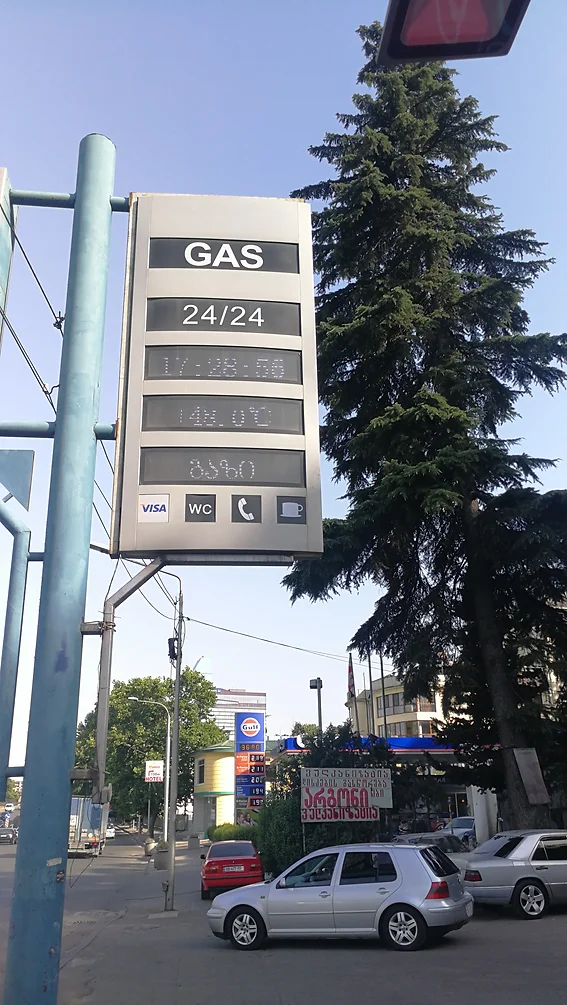
Full of energy I cycled out of Tbisili southbound, first through dense traffic but soon on empty roads. I took the longer and more hilly E117 road towards Armenia as almost all traffic takes the direct E001 highway.
Fun day to cycle. Outside Tbisili first a stormy headwind welcomed me for 2 hours with gusts so strong that I had to get off the bike. Later I increased my tour top speed to 74.7 km/h.
I stopped at a street market to get some fruit and vegetables for dinner. The friendly market woman with traditional clothing and golden teeth just smiled warmly and didn’t let me pay. People here have something authentic and good inside – something they can be proud of.
I pitched camp on a hill in the Mashavera river valley. While I was cooking dinner a man came by and invited me to stay in his home but I already felt well settled for the night and politely declined with thankfulness.
In the last town the locals on the street market had said something about jackals or wolves and at night I heard howling in the valley – great that the ecosystem here is intact.
What kind of life story do you want to write? Do you want to form a life path you are proud of?
I’m just a cyclist but in my humble opinion already a bit of consciousness exploration can move mountains – things seem to change almost automatically through self-reflection.
When we feel and listen more into our consciousness, our personal values become clearer, we naturally channel our energy more into activities aligned with our true self, and overall we move away from following external ideologies towards becoming free inside – we become authentic.
The life story we write, how we position us towards the line separating good and evil – is this a binary choice?
I don’t think so given how deep our life is. Our brain is one of the most complex things in the universe and our life journeys are a marvel of complexity – we are all constantly creating a stream of choices bending our reality.
Nobody really “knows” how our consciousness works when trying to articulate an answer in language. But perhaps the line running through all human hearts is best handled non-cognitively – when we search an answer in our feelings with the courage to be ourself.
Mathematically seen, perhaps courage increments up when cultivating courage in our consciousness generates more energy than it takes … that would be a really good investment of our consciousness energy!
I packed camp early and then cycled uphill towards the Guguti border crossing at 1,400 meter elevation.
A friendly crew of road maintenance workers were the only people I met on that stretch.
I stopped at the Dmanisi Archaeological Site where human fossils and stone tools have been found dating back 1.7 million years – which changed the scientific discussion around humanity’s origins.
Among the Dmanisi fossils is a skull and jawbone showing that the hominid male had lost all but one tooth already years before his death. According to archaeologist this could be the first sign of human compassion if the toothless individual had received support from others to survive.
Everything in this area felt old and a bit mysterious.
The last 10 km before border were unpaved and I saw zero traffic. Guguti, the border town, lays directly at the tree line.
I wanted to spend my last five Georgian Lari on a coffee to reflect for a moment on this fantastic country and the amazing people living here, but everything was closed.
Georgia, thank you for the impulses on courage – a powerful consciousness ingredient nurturing our reality-bending force.
